GRADUATE STUDENT HANDBOOK
ACADEMIC YEAR 2024
GRADUATE AFFAIRS, FACULTY OF MEDICINE CHULALONGKORN UNIVERSITY


GRADUATE AFFAIRS, FACULTY OF MEDICINE CHULALONGKORN UNIVERSITY

The Faculty of Medicine Chulalongkorn University (MDCU) provides academic excellence through the topnotch professors and specialists of the country, together with diversified medical concentrations and the faculty’s collaboration with top institutions from around the world. We strive to excel and enhance our students to become well-prepared world citizens who are ready to contribute more for the growing global health.
This student handbook provides you with important policies, procedures, practices and information that would help you live and study pleasantly with Chulalongkorn University. The Student Handbook covers five topics including:
1. About Us
2. Process how-to for students
3. Student Life and Activities
4. Contact and Places
5. Chulalongkorn University Regulation
On behalf of the University, we hope that your time as a student at Chulalongkorn University is successful and memorable.

Chulalongkorn University
Chulalongkorn University, nicknamed Chula, is a public and autonomous research university in Bangkok, Thailand. The university was originally founded during King Chulalongkorn’s reign as a school for training royal pages and civil servants in 1899 at the Grand Palace of Thailand. Chulalongkorn University is a comprehensive and research-intensive university. It is ranked as the best university in Thailand in many aspects include quality of students, quality of research, quality in particular subjects, university reputation, environmental management systems.
To take the lead in creating knowledge and innovations from cutting-edge research that will build and support a sustainable society.
Mission
1) Develop Future Leaders
Create a culture of lifelong learning through academic programs that promote entrepreneurship and sustainability.
2) Create Impactful Research and Innovations
Stimulate innovative enterprises for society by creating research that is in-depth and extensive, and adding innovative curriculums and interdisciplinary fields.
3) Guide and Moves Forward the Local and Global Engagement Engage in partnerships with local and global communities, governmental agencies, industries, and universities for a more sustainable society and economy.
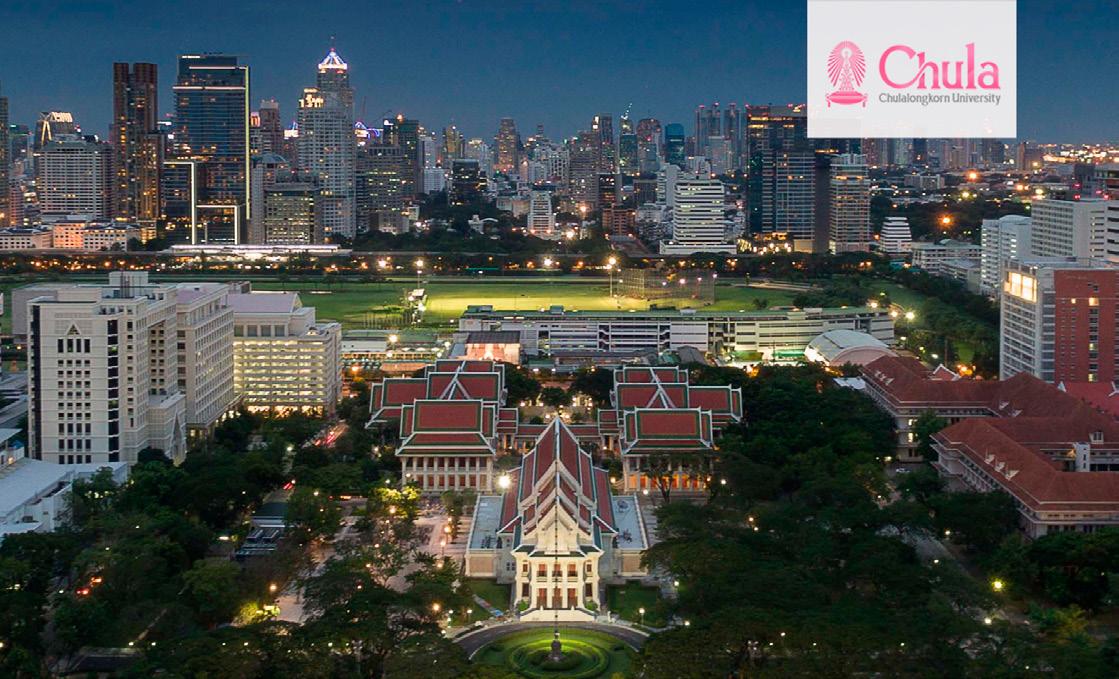
Visit the University website https://www.chula.ac.th/en/ https://www.youtube.com/ watch?v=yrju30jpx-I
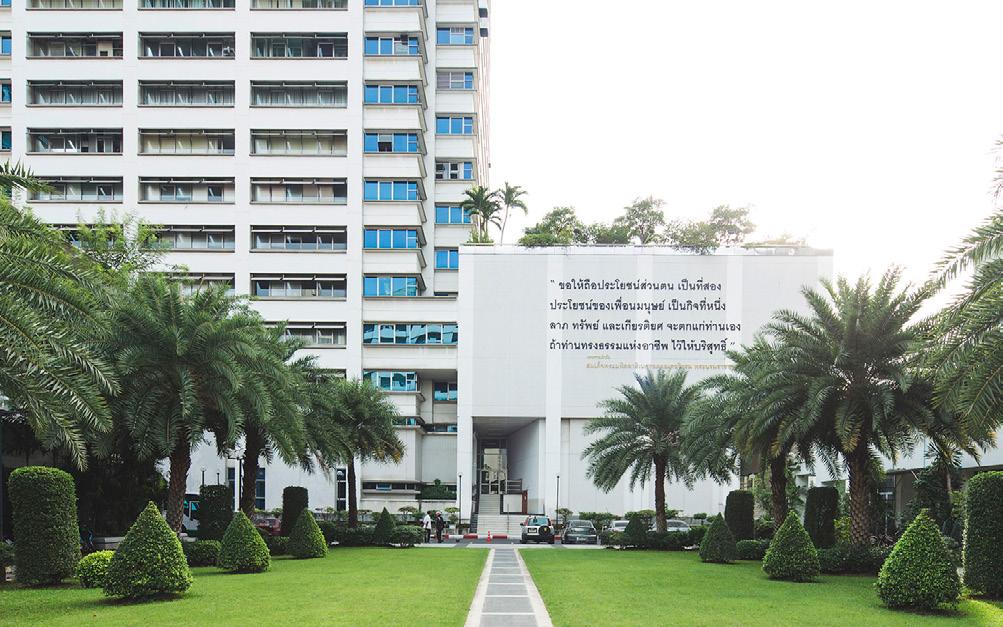
The Faculty of Medicine, Chulalongkorn University (MDCU) was established in 1947 on royal principles of His Majesty King Ananda Mahidol (Rama VIII) to develop outstanding and selfless medical doctors to provide ample and better healthcare to public. Being housed in the King Chulalongkorn Memorial Hospital (KCMH) which operates under the Thai Red Cross Society, the Faculty is a part of the robust triad of health excellence known to be the pillar of the society and a leading national entity of excellence for medical education and healthcare. This is clearly evidenced by the active engagement of the triad partnership with the COVID-19 crisis and the production of COVID-19 vaccine.
Philosophy: MDCU, together with KCMH and the Thai Red Cross Society, aims to move academic advancement toward international level as well as to serve mankind with virtue.
With over 75 years of experience and international collaborations, MDCU has thrived to realize its vision - To be a role model of medical institutions with virtue and ability to set international standards.
Under the mission to produce quality and virtuous graduates and specialists; to conduct valuable research; to offer medical services and education to lead the society; to be the nation and the world’s academic citation; and to provide the community good quality of life.
Website: http://grad.md.chula.ac.th/
Get to know more about Faculty of Medicine, Chulalongkorn University: https://youtu.be/0bXbOjDH3rM
MDCU Campus Tour
https://www.md.chula.ac.th/virtual-tour/

MDCU offers a wide array of challenging graduate programs including Master’s Degree, Ph.D., Residency, and fellowship training. For interdiscilpinary programs, please visit : https://www.grad.chula.ac.th/en/interdis_main_eng.php
Ph.D.
Health Research and Management
Medical Biochemistry
Medical Physics
Medical Sciences
Mental Health
Medicine
M.Sc.
Health Research and Management
Medical Biochemistry
Medical Parasitology
Medical Physics
Medical Sciences
Sports Medicine
Mental Health
Medicine
Health Professtions Education
Higher Graduate Diploma of Clinical Sciences Program (Residency training)
Graduate Diploma in Mental Health
Ph.D. (international programs)
Biomedical Sciences and Biotechnology
Clinical Sciences
M.Sc. (International Programs)
Health Development
Clinical Sciences
Program
Clinical Sciences
Double Ph.D. in Biomedical Sciences and Biotechnology
Medical Sciences
Person in Charge Email Tel.
Chutikarn Suksaichol Boontarika Pongniwatcharoen clinicalsciencesmdcu @gmail.com (662)-256-4475, 256-4663 Ext. 15
Apinya Butlee Pitchapon Karndarat jointliverpool @gmail.com (662)-256-4475, 256-4663 Ext. 11
Apinya Butlee Pitchapon Karndarat medical.sciences.cu @gmail.com (662)-256-4475, 256-4663 Ext. 16
Medical Physics Walailak Kitticharoenkiat walailaks_radio @hotmail.com (662)-256-4418
Health Development Sureerat Nuchnual thaicertc @hotmail.com (662)-256-4475, 256-4663 Ext. 18
Graduate Affairs, Faculty of Medicine, 3rd Floor, Ananda Mahidol bldg. grad.mdcu @gmail.com (662)-256-4475, 256-4663

Clinical Sciences (Ph.D./M.Sc.)
Tuition/Semester 133,900 Baht
Program Fee/Semester 30,000 Baht
Total/Semester 163,900 Baht
Double Ph.D. in Biomedical Sciences and Biotechnology (Chulalongkorn University – University of Liverpool)
Tuition/Semester 133,900 Baht
Program Fee/Semester 94,000 Baht
Total/Semester 227,900 Baht
Medical Sciences (Ph.D./M.Sc.)
Tuition/Semester 133,900 Baht
Program Fee/Semester 30,000 Baht
Total/Semester 163,900 Baht
Health Development
Tuition/Semester 133,900 Baht
Program Fee/Semester
- First Year 105,500 Baht
- Second Year 72,500 Baht
Total/Semester (First year) 239,400 Baht (Second year) 206,400 Baht
Medical Physics
Tuition/Semester 133,900 Baht
Program Fee/Semester 30,000 Baht
Total/Semester 163,900 Baht
FACULTY OF MEDICINE Chulalongkorn University

New students entering the university for the first time in the first semester are required to submit a request for registration via the internet at https://www.reg.chula.ac.th/eindex.html.
1. Log on to https://www.reg.chula.ac.th/eindex.html After logging on the website, students have to choose "Login"
Access to Online Registration System, and follow the instructions below:
1) Enter the Student ID
2) Enter the Password which is used for the Internet run by the Information Technology Department, Chulalongkorn University. For the new students, they can ask for their passwords by access to http://www.it.chula.ac.th/New_Password_for_Student, or contacting the Office of Information Technology, 4th Floor, Chamchuree Building 3, if there is a problem about logging on.
3) Click Submit > Registration
2. Click on "Registration Request (CR 11)". In order to make a request for registration, the students have to strictly follow the instructions:
- Complete information about a course or the course required
- Complete information about a course or courses in the Registration System
- Confirm
3. The students should read the instructions carefully and then click "Accept".
4. Later on, the students have to complete all details required in each course.
5. When all information required for registration is entered and checked, students have to scroll down to click on “Submit” and all information entered will reappear including the group of subjects.
6. After checking the entire course details thoroughly, the students have to confirm the registration within the deadline by clicking on “Confirm” In other words; the students have completed the registration procedures. All courses and their credits including "CR 11 already confirmed" will appear. In addition, the date for picking up CR 74 (Student Registration as Requested) will be shown.
7. The confirmed courses which are already processed (prioritized) will be shown in CR 74. Students cannot correct course details / add subjects after the confirmation of CR 11. They can do so during the period of adding-dropping and changing. Therefore, the students can confirm CR 11 only once within each semester.
8. The students are able to check the results of their registration by clicking on "Personal Information > Registration Request". Last but not least, as soon as all tasks have been done, the students should not forget to "Log out" of the system.
Payment of tuition fees will be made via Kasikorn Bank or KBank channels. Students are required to have a KBank savings account and K PLUS when making tuition fee payment, which must be under the following conditions:
1. Students who already have a KBank savings account (opened at a KBank branch located within the Bangkok metropolitan area) are not required to open a new account.
2. If a student has a KBank savings account which was opened at a branch outside the Bangkok metropolitan area, they are allowed to use the existing account. However, if they apply for a new student ID/debit card linked to the existing account and use it for cash withdrawal at an ATM located in the Bangkok metropolitan area, they will be charged a service fee as established by KBank.
3. If a student has no KBank account or wants to open a new account, they can open an account (with no minimum deposit required) and apply for K PLUS at the Siam Square Branch, Chamchuri Square Branch, or Chulalongkorn Hospital Branch.
4. If students cannot open an account at the above venues, they may go to any KBank branch in the Bangkok metropolitan area to request an account opening and application for K PLUS, which is subject to the normal conditions for account opening established by KBank (500 baht minimum deposit required).
5. If students already have a KBank account per item 1 or 2 and want to apply for K PLUS, they may bring the account information to apply for K PLUS service at any KBank branch.

6. If students already have a KBank account and debit card, they may activate K PLUS themselves by following the steps below.
- Download K PLUS application
- Enter your debit card number
- Enter your debit card PIN
- Enter your personal information
- Set your password, and the service is available immediately
- You can now conduct transactions via the 3G/4G internet network. If you want to use K PLUS via WiFi network, you have to access the “Settings” menu and choose “Full service via WiFi”
7. To learn more about how to activate K PLUS, please visit https://www.kasikornbank.com/ en/personal/Digital-banking/kplus/functions/personalization/Pages/me-mode.html
8. Any further information about CU NEX, please visit https://www.reg.chula.ac.th/FQ&A-e.pdf or CU NEX Call Center Tel. 02-008- 6556
9. Other fees e.g. program fees informed by the program officers must be paid at the Faculty, Office of Finance, Ananda Mahidol Building, 2nd floor.
For each semester, the University will deduct the current students’ tuition fees from their accounts at Kasikorn Bank. The University opens a savings account for each student in the first semester. On the day that students receive their student cards and bank books, they have to produce a letter of approval so that the bank can deduct the fees from their accounts. When they have to pay their tuition fees for each semester, they have to
1. Students can check the amount of tuition fees at the website: https://grad.md.chula.ac.th/curriculum.php
2. The courses which are accepted will be designated with the amount of fee to be paid and students’ account number. Students are advised to check their account number and deposit enough money in their accounts for the deduction by the deadline of the academic calendar. The bank will deduct the amount of tuition fees payable to Chulalongkorn University’s account.
3. If the bank cannot deduct the fees, the results of paying tuition fees will appear on the screen and the system will ask students to print the CR8. The payments should be paid in cash at the bank by the deadline specified in CR8.
4. Students can inquire about the result of payment deducted from the account via Internet the day after depositing the money at https://www.reg.chula.ac.th/eindex.html under “Payment Information” and “Result of Payment”. If students make the payment at the counter, they can check the result on the first day of classes.
5. Students can change their method of payment from deduction of tuition fees from their accounts to printing the CR8 only during payment of regular registration by accessing https://www.reg.chula.ac.th/eindex.html. Students have to select Payment Information and go to Paying Tuition Fees. Then, they must click Change of Payment at the bottom of the screen and confirm before printing the CR8 and take it to the bank to make the payment. If students, however, would like to make payment by deducting the tuition fees from their accounts again, they have to file a request at the Office of the Registrar.
6. Students can print for the receipt of tuition fee payment via internet at https://www.reg.chula.ac.th/eindex.html from the first day of classes. (Follow the advisement for printing from Office of the Registrar’s announcement)
7. Students who would like to have a copy of Rates of Tuition Fee for reimbursement can download such information from https://www.reg.chula.ac.th/eindex.html under “Paying Tuition Fees”.
* Please note that the tuition payment is subject to change due to the Office of the Registrar. To confirm the tuition payment, please contact the program officers.
Students, who have registered for their courses and paid the tuition fees, and wishing to add courses or change the sections for the courses they have registered may do so during the first two weeks of the semester. Those wishing to drop any course must do so within the first six weeks of the semester. The process may be done via Internet at website: http://www.reg.chula. ac.th/eindex.html (follow the instructions in registration manual of registration website)
1. To enter the system click on “Login”, “Registration/Personal Information” and choose “Registration”.
2. Choose Registration: Late / Add / Drop. Record the courses and sections

3. Confirm your registration.
4. Check the result of your registration via Internet under the menu "Personal Information"
5. Log out in order to exit the system; Students need to log out from the system each time they stop using the system. This is done in order to prevent unauthorized persons from accessing the system.
* The status of students who fail to register for courses within the first two weeks of the semester will be terminated.
Students can withdraw courses during weeks 7- 12 of the semester or weeks 3 – 4 of summer by following the steps below:
1. Students have to express their intention to withdraw via Internet at https://www.reg.chula. ac.th/eindex.html by the deadline specified in the academic calendar.
2. After that, students have to print the request form CR48 (Request Form for Course Withdrawal) and provide reason(s) for withdrawal. Then the form has to be approved by the advisor or course instructor.
3. Hand in the approved request form at the Faculty Registrar Office so that the Faculty Registrar can submit the form to the Dean for consideration.
4. Students can inquire about the result of withdrawal via Internet at https://www.reg.chula. ac.th/eindex.html under "Personal Information Inquiry" and "Inquiry about Course Withdrawal Status." The date of the request form acceptance and date of withdrawal confirmation from the faculty as well as the status of course withdrawal will appear on the screen.
5. After filing the CR48 (Request Form for Course Withdrawal), if the request is approved, the symbol W will appear in the Status column.
6. Students print the result of course withdrawal and keep it as the evidence of withdrawal.
A student may enter a master's degree scheme in any of the following cases:
1. When a student submits a petition for entering a master's degree scheme within 2 weeks of the first semester he/she is enrolled in the program or within 2 weeks from the end of the second semester.
2. A student fails to obtain the S grade in the "qualifying examination" within the following periods of time, starting from the first semester he/she is enrolled in the program:
(a) within 3 semesters, for those with master's degrees upon their entry to the program
(b) within 4 semesters, for those with bachelor's degrees upon their entry to the program
(c) a student has received the U grade twice in the "qualifying examinations" and gained approval from the Program Committee to change the level to the master's degree scheme.
After an approval of the change in level of study has been granted, all the courses a student has registered and the grades he/she has obtained shall be transferred to his/her record in the new program/scheme and applied for the computation of his/her GPA throughout his/her study.
The Program Committee shall be responsible for consideration on entry to the program, change in level of study and return to the program/scheme. The issue shall then be submitted to the Faculty Board for approval and the Office of Registrar shall be informed of the approval within 2 weeks from the day of the approval.
A student may request a change in the area of study offered by the University according to criteria below. The change must be approved by the Program Committee, the Faculty Board of the faculty to which he/she was originally affiliated and that of the faculty to which he/she is to be affiliated.
(1) A student must be enrolled at the University for a minimum of one semester but no longer than one academic year.
(2) A student has achieved a GPA of no less than 3.00.
*** A student who has changed an area of study may be exempted from certain courses, if approved by the Faculty Board.

Students who wish to change their title, name and last name, or spelling of names should do so only during the time of their studies by following these procedures.
1. Student collects CR47 (Request form for Name-Surname, Title Change) at the Office of Registrar.
2. Submits the CR47 at the Office of Registrar and attaches the copy of documents demonstrating change of title, name and last name, or marriage certificate, or an order indicating change in rank and title together with all relevant original documents.
3. For those wishing to apply for a new student ID card, a 100 baht fee is charged and collect the student ID card at the Office of the Registrar.
* It is the responsibility of the student to check his /her title, name and last name, or correct spelling. After the Faculty has declared that the student has graduated, changes or alterations can no longer be done.
The student checks his/her record such as parent's name, guardian's name, guarantor's name, identification number (passport number), house registration, birth place, birth date, nationality, religion, initial of academic qualification and date of graduation. Should there be any mistake, make a request for change during the time of study by following these procedures.
1. Collect CR33 (Request Form for Change of Student Record) at the Office of Registrar or download from https://www.reg.chula.ac.th/eindex.html.
2. Submit CR33 at the Office of Registrar and attach copies of all relevant documents.
* It is the responsibility of the student to check his/her record during the time of study. After the faculty declares that the student has graduated, no alteration can be made.
Students check and print Grade Report (CR60) at https://www.reg.chula.ac.th/eindex.html. Should any M I or X symbols appear on the CR60, Students are required to follow up and inquire about the results from the website every Friday of the week until all the results of the study is completed.
Students who need to take a leave of absence should consult Chulalongkorn University Regulations regarding Undergraduate Level Education, B.E. 2556 number 14 or Chulalongkorn University Regulations regarding Graduate Level Education, B.E. 2551 category 9 with the following procedures:
1. Request a CR49 (Request Form for Leave of Absence) from the Faculty Registrar’s Office or download from https://www.reg.chula.ac.th/dlforms.html.
2. Submit the CR49 together with evidence of reasons for applying for leave of absence to the Faculty Registrar’s Office.
3. Contact the Office of the Registrar for results and make a payment to retain your student status within the first two weeks of the semester. (This payment does not apply to students who have already paid their tuition fees for the semester in which they are taking a leave of absence.)
4. In case that students have already paid their tuition fees for the semester in which they are taking a leave of absence but submitting the request for leave of absence at their faculty before the first day of the semester, they can make a payment to retain their student status. They also have to submit a CR45 asking for a refund of the tuition that has already been paid by week 6 of the semester.
5. Students who have not registered for courses and requiring leave of absence must submit their request and pay the necessary fees within the first two weeks of the semester.
> Application for Leave of Absence due to Military Enlistment or Military Service (Rule No. 14.1.1) and due to International Student Exchange Scholarship Program or any Scholarship Program that is beneficial to students’ higher education (Rule No. 14.1.2), student must provide necessary documents as proof along with the application form.

> Application for Leave of Absence due to Medical Reasons (Rule 14.1.3) Students who fall sick and require medical treatment or rest on doctor’s orders for a period exceeding 20% of the entire study period or more than 3 weeks may apply for sick leave. A doctor’s certificate issued from a government hospital or a private hospital accredited by the Ministry of Health or an institute within Chulalongkorn University must be provided along with the application form.
There are two types of sick leave:
If a student becomes ill before the semester ends and continues to be sick until the examination date, rendering them unable to take one or more, or all subjects, they must submit an application for sick leave before the examination date. This is necessary as the period for requesting a leave of absence has already elapsed.
In situations where a student has completed the semester of studies and becomes ill during the examination period, preventing them from taking one or more, or all subjects, they must submit an application for sick leave specifically for the examination period.
The following procedures should be undertaken for both types of sick leave:
1. Obtain a CR44 (Request Form for Sick Leave) form from the Faculty Registrar's Office or download from https://www.reg.chula.ac.th/dlforms.html.
2. Submit the CR44 (signed by the Academic Advisor) to the Faculty Registrar's Office. The form must be accompanied by a physician's certificate from a government or state enterprise medical facility or a private medical facility accredited by the Ministry of Health.
3. Contact the Office of the Registrar for results. Students have to submit CR44 within 1 week of the day they get sick and study item 105 in the Regulations of Chulalongkorn University about the Education System for Graduate Level.
If the sick leave request form is approved, the highest grade(s) awarded for the course(s) that students who have not sat for the examination(s) are B (for graduate level).
Students who have missed an examination due to extreme circumstances should refer to item 112 in the Regulations of Chulalongkorn University about Education System for Graduate Level and do the following procedures:
1. Obtain a CR41 form from the Faculty Registrar’s Office or download from https://www.reg. chula.ac.th/dlforms.html.
2. Submit the CR41 furnished with documents explaining the reason for the absence to the Faculty Registrar’s Office.
3. Contact the Office of the Registrar for results.
Graduate students who have not yet published their thesis dissertation / independent studies or students who do not pass the English test within the time specified by the Graduate School should follow the guidelines below:
1. Obtain CR32 (Request for Retaining Student Status) from the Faculty Registrar’s Office or download from https://www.reg.chula.ac.th/dlforms.html.
2. Submit CR32 at the Faculty Registrar’s Office.
3. Pay the fee (5,000 baht) at the Office of the Registrar.

Students who wish to resign from the University should submit a request to the Dean and take the following procedures:
1. Obtain a CR31 (Request form for Resignation) from the Faculty Registrar’s Office or download from https://www.reg.chula.ac.th/dlforms.html.
2. Submit the CR31 furnished with documents explaining the reason for the resignation to the Faculty Registrar’s Office.
3. When the Dean has given the approval the resignation will take effect from the date the resignation request was submitted to the Faculty Registrar’s Office.
4 Students whose resignation has been approved will not be entitled to any refunds for the tuition fees which have been paid.
Thesis preparation is one of the requirements for graduation which requires the thesis to be submitted as a part of the study. In preparing their thesis, students must avoid copying a piece of writing from someone else and representing it as their own work without quoting the reference. This plagiarism is considered to be an academic fault which causes damage to the reputation of the University, affects the quality and academic ethics, and leads to a disciplinary action.
Moreover, students should pay attention to the correct typing format for the thesis since Chulalongkorn University’s Regulation on Graduate Education specifies that “typing format for thesis must comply with the Thesis Typing Format Handbook prepared by the Graduate School”.
The Graduate School has provided the Thesis Typing Format Handbook and Template for Thesis Typing to help students in typing their complete thesis, reducing their typing errors, and preparing their thesis in a standardized format. Students can download Thesis Typing Format Handbook and Template for Thesis Typing by following this link: http://grad.md.chula.ac.th/download.php
An examination of a thesis proposal is aimed at testing a student's knowledge and understanding of the research topics, methodologies, approaches, and techniques in solving possible problems in their research.
The thesis proposal examination committee, for master level, must comprise no less than three members, and for doctoral level, must comprise five members, and may or may not include a qualified examiner from outside the University. There are two types of the committee, i.e.:
(1) The Thesis Proposal Examination Committee, formed by the Program Committee.
(2) The Thesis Proposal Examination Committee for a particular thesis proposal, appointed by the Program Committee.
The Thesis Proposal Examination Committee has the following responsibilities:
(1) Examining a student's knowledge and under- standing by considering the scope of the study, its duration and benefits gained from the study;
(2) Report the result of the examination to the Program Committee and the Faculty Board, respectively, for consideration.
Students must submit their thesis proposal to the Program Examination Committee for approval along with the names of their advisors and members of the thesis examination/defense committee.
The following are procedures and timelines as announced by the Faculty Board: Students must gain approval of their thesis/ dissertation proposals within the following periods of time:
(1) For a master's degree program: within two academic years, starting from the first semester they enroll in the program.
(2) For the Master - Doctoral continuing program: any semester, no less than 60 days before the day of the examination.
The Program Committee, with consent from the Faculty Board, may require the students in the program to take an examination and gain approval of their thesis proposals before the above mentioned periods of time. This must be announced before admission of students to the program.

Failure to gain approval of their thesis proposals within the aforementioned period of time shall result in the termination of the student's status as graduate student. Exceptions may be granted in extreme cases where the Faculty Board will grant an extension of another semester following the last semester when the proposal was due for submission.
After the thesis proposal has been approved, the Faculty must make an announcement of the topics and the names of persons writing the thesis as well as the names of the thesis advisors for submission to the Graduate School to publicize.
Changes of thesis/ dissertation supervisors or the thesis/dissertation examination committee can be made only for extreme cases. The change must be approved by the Program Committee and the Faculty Board, respectively, before it is submitted to the Graduate School for information.
- Students whose thesis proposals have not been approved within the time limit lose their student status, unless they have a good reason for which the Faculty Board may extend the deadline by one semester.
At the doctoral level, students are also tested to ensure that they have adequate foundation and in-depth knowledge to write a dissertation. The Proposal Defense Committee at the doctoral degree level consists of five members, and may or may not include a qualified examiner from outside the University.
Students must submit their dissertation proposal to the Program Examination Committee for approval along with the names of their advisors and members of the dissertation defense committee.
Following are procedures and timelines as announced by the Faculty Board:
(1) Ph.D. program students must submit their dissertation proposal within three years of entering the program.
(2) Ph.D. students registered through the continuing program may submit their thesis proposal at any time but not less than 60 days prior to the thesis defense.
Thesis advisors or thesis defense committee members may be changed if there is sufficient reason or if circumstances dictate. All such changes require the approval of the Program Administration Committee and the Faculty Board.
Students whose thesis proposals have not been approved within the time limit lose their student status, unless they have a good reason for which the Faculty Board may extend the deadline by one semester.
The dissertation proposal examination committee must comprise five members, and may or may not include a qualified examiner from outside the University. There are two types of the committee, i.e.:
(1) The Dissertation Proposal Examination Committee, formed by the Program Committee.
(2) The Dissertation Proposal Examination Committee for a particular dissertation proposal, appointed by the Program Committee.
The Dissertation Proposal Examination Committee has the following responsibilities:
(1) Examining a student’s knowledge and understanding by considering the scope of the study, its duration and benefits gained from the study.
(2) Report the result of the examination to the Program Committee and the Faculty Board, respectively, for consideration.
The Program Committee, with consent from the Faculty Board, may require the students in the program to take an examination and gain approval of their thesis proposals before the above mentioned periods of time. Failure to gain approval of their thesis proposals within the aforementioned period of time shall result in the termination of the student’s status as graduate student. Exceptions may be granted in extreme cases where the Faculty Board will grant an extension of another semester following the last semester when the proposal was due for submission.
After the thesis proposal has been approved, the Faculty must make an announcement of the topics and the names of persons writing the thesis as well as the names of the thesis advisors for submission to the Graduate School to publicize.
Changes of thesis/dissertation supervisors or the thesis/dissertation examination committee can be made only for extreme cases. The change must be approved by the Program Committee and the Faculty Board, respectively, before it is submitted to the Graduate School for information.

Students can take a thesis examination only when they fulfill all the 3 following requirements:
(1) They have registered for all the courses required by the Program.
(2) Their research proposals have been approved by the Faculty Board no less than 60 days before the day of the examination.
(3) There is evidence that the students have submitted research articles, which are part of their theses, to academic journals for publication, or that the students have been accepted to present their research in academic conferences.
A student who wishes to take a thesis examination shall submit the final version of his/her thesis, which has already gained approval from his/her supervisor, to the Graduate School no less than 2 weeks before submitting a petition for an appointment to be made for the thesis examination. If failed to do so, rules shall be applied depends on each program, for example, for Clinical Sciences program, students evaluation scores will be deducted which might effect their grades.
After the thesis format has been checked by the Graduate School, the student, with the consent of his/her thesis supervisor, shall submit a petition for an appointment to be made for the thesis examination to the Faculty within the period stipulated by the Program Committee. The petition must be submitted no less than two weeks before the exam date. The Program Committee shall make an announcement publicizing the examination date no less than 1 week before the examination date.
On the day of the thesis examination the Thesis Examination Committee, including the Chairperson and Committee Members, must consist of a minimum of 3 examiners for an examination of a thesis at the master's degree level. In cases where the members fall short of the aforementioned number and components, the examination is to be postponed.
Once the thesis examination has been completed, the Thesis Examination Committee should convene in private in order to determine the outcome of the exam. Afterwards, the Chairperson of the examination shall submit a report of the results, through the Chairperson of the Program Committee and Department Head, to the Faculty Board within 2 weeks from the day the examination was completed. The results must be notified to the student within 3 weeks from the day of the examination.
Students can take a dissertation examination/defense only when they fulfill all the 3 following requirements:
(1) They have registered for all the courses required by the Program.
(2) Their research proposals have been approved by the Faculty Board no less than 60 days before the day of the examination.
(3) There is evidence that the students have submitted research articles, which are part of their theses, to academic journals for publication, or that the students have been accepted to present their research in academic conferences.
A student who wishes to take the dissertation examination/defense shall submit the final version of his/her thesis, which has already gained approval from his/her supervisor, to the Graduate School no less than 2 weeks before submitting a petition for an appointment to be made for the dissertation examination/defense. If failed to do so, rules shall be applied depends on each program, for example, for Clinical Sciences program, students evaluation scores will be deducted which might effect their grades.
After the dissertation format has been checked by the Graduate School the student, with the consent of his/ her thesis supervisor, shall submit a petition for an appointment to be made for the thesis examination to the Faculty within the period stipulated by the Program Committee. The petition must be submitted no less than two weeks before the exam date. The Program Committee shall make an announcement publicizing the examination date no less than 1 week before the examination date.
On the day of the dissertation examination the Dissertation Examination Committee, including the Chairperson and Committee Members, must consist of a minimum of 5 people for an examination of a dissertation at the doctoral degree level. In cases where the members fall short of the aforementioned number and components, the examination is to be postponed.

Once the dissertation examination has been completed, the Dissertation Examination Committee should convene in private in order to determine the outcome of the exam. Afterwards, the Chairperson of the examination shall submit a report of the results, through the Chairperson of the Program Committee and Department Head, to the Faculty Board within 2 weeks from the day the examination was completed. The results must be notified to the student within 3 weeks from the day of the examination.
Please visit https://ithesis.grad.chula.ac.th/ under Tutorials section for Student Manual and Tutorial Video of Thesis/Dissertation Submission Regulation.
Students who have completed all the requirements in the curriculum in their final semester, and expect to graduate, should fill out their information for graduation via the internet at https://www. reg.chula.ac.th/graduationen.html under the category of “Request for Graduation" and follow these procedures:
1. Check for correction of personal information, academic records and curriculum under the category of "correction for student records". Students should check all relevant information before requesting graduation. Should there be any change/alteration of information, students should contact the Office of the Registrar for corrections, and present evidence (if any). After the Faculty declares the annual list of graduates, any changes cannot be made.
2. Students fill out their information for graduation under the category of “Request for Graduation" within the period of time stipulated in the Academic Calendar of each semester. Should it be done after the period of time allowed, they will be subject to a fine (1,000 baht) from the Office of Registrar according to the regulations.
3. In the case that a student is unable to graduate, the information for requesting graduation will become void, and the student will need to file the information again in the next semester in which the student expects to graduate.
* The student who has filled out Information for graduation cannot register in the next semester unless the student has not been able to graduate. In such cases the student must inform the Faculty Registrar's Office of his/her affiliation.
* Students can find out the result of the request for graduation under the category "Graduates". If the list of graduates is not found, please contact the Faculty Registrar's Office.
This is the list of things you should keep in mind after you have recorded the information required for submission of the request for graduation:
1. A list of names of students who have completed their studies and the date of approval from The University Council will appear on the website: http://www.reg.chula.ac.th. Inquiries can be made under the topic "graduates". If your name has not been posted, please contact the Office of Registrar for an announcement list.
2. Upon approval from the University Council, students will receive the following:
2.1 Two copies of the transcript
2.2 Two copies of the document certifying academic credentials
3. The documents aforementioned can be collected 5 working days following the date of the University Council approval. The Office of the Registrar reserves the right to cancel those documents if they are not collected within 60 days following the date of the University Council approval.
4. If you are not able to collect the documents yourself the following arrangements may be made:
4.1 Authorize someone to take collection on your behalf by showing an identity card, government/state enterprise official card, driving's license or any other picture ID. (Document of authorization can be downloaded from https://www.reg.chula.ac.th/ eindex.html)
4.2 Arrange for them to be sent by post by downloading and filling out a CR 42/2 Request (Request for Delivery of Documents by postal service). Purchase a postal order for the value specified in the CR 42/2 Request from the post office payable to "The Office of

the Registrar, Chulalongkorn University" In an envelope, send the postal order together with the CR42/2 Request, you have filled out addressed to "The Office of the Registrar, Chulalongkorn University, Phya Thai Road, Patumwan District, Bangkok 10330"
5. Follow up on commencement ceremony schedules as follows:
5.1 Commencement ceremony rehearsals usually take place between mid-September to early October.
5.2 Commencement ceremonies usually take place around the middle of the month of October each year.
5.3 Commencement ceremony rehearsal schedules for each of the Faculty as well as commencement day schedules will be posted on the website (https://www.reg.chula. ac.th/graduationen.html).
The purpose of the Grade Appeal Policy is to provide the student with a safeguard against receiving an unfair FINAL grading, while respecting the academic responsibility of the instructor. The procedure of grade appeal submission is as follows:
Step 1: Student who wishes to question about final grading must discuss the issue firstly with the instructor within 5 working days after receiving the grade. In most cases, the discussion between the student and the instructor should suffice and the issue will be concluded. The student should be aware that the only valid basis for grade appealing beyond this first step is to demonstrate that an inappropriate grade was assigned as a result of prejudice, arbitrary consideration or other improper conditions such as mechanical/management error.
Step 2: If the student’s concerns remain unresolved after the discussion with the instructor, the student may submit Grade Appeal Review Form to the Program Director within 5 working days after discussion with the instructor. The Program Director will meet within the timeframe with the student, and, if he or she believes that the complaint may have merit, with the instructor. The Program Director will communicate the result of these discussions to the student.
If the issue remains unresolved after Step 2, the student may submit a Grade Appeal Form (CR35) to the Office of the Registrar, Faculty of Medicine to request an ad hoc consideration of the appeal. The form must be filed within 30 working days after grade announcement day in each semester (shown in academic calendar or after the dean’s additional grade approval). Any appeal filed after the set time will not be accepted.
Step 3: The ad hoc committee will examine the case and may gather additional information as deemed necessary. If the committee concludes that the grade was assigned in a fair and appropriate manner, the written conclusion will be sent to the student and instructor. In the case that there are compelling reasons for changing the grade, a request to the instructor will be made in writing.
If the conclusion of the committee is not satisfied by the student or instructor, the University legal advisors may be consulted to resolve the matter.

If student has complaint for any other aspects, such as the quality of supervision or feedback, or the treatment from staff member, the complaints can be submitted by filling the Faculty Complaint Form. It is required that background of the complaint as well as the student’s contact details are given. Evidence and outcome expectation are optional.
Once the complaint is filed, the Faculty will respond to the issue and inform the complainant as soon as the investigation is completed, normally within three weeks. If the complaint is complex or needs additional arrangement, response to the matter may take longer.
The response to complaint is as follows:
1. Once the complaint is submitted, the Faculty officer will primarily examine the case and allocate it to the relevant work unit. The cases related to graduate programs and activities will be referred to the Division of Graduate Affairs while other complaints will be allocated to Division of Quality Management.
2. The responsible work unit will process the complaint accordingly and inform the student of the result. The time frame varies with the complexity of the case and needed procedure.
3. The student may submit further concern or suggestion regarding the resolution and work performance of the responsible work unit.
4. The work unit concludes the complaint and its resolution and sends the document to the Division of Quality Management for reporting in the annual meeting of the Risk Management Committee.
We highly recommend students to regularly check the update for Academic Year Calendar and other timeline at RegChula website (https://www.reg.chula.ac.th).
Opening
First day of classes
Midterm Examinations (if any)
End of first semester activities
Last day of class
Final Examinations
End of first semester
First day of classes
Midterm Examinations (if any)
End of second semester activities
Last day of class
Final Examinations
End of first semester
First day of classes
Last day of class and Examinations
End of summer session
Last Day of Academic Year
Monday, August 5, 2024
Monday, September 23 – Friday, September 27, 2024
Sunday, October 27, 2024
Friday, November 24, 2023
Monday, November 25 – Monday, December 9, 2024
Wednesday, December 11, 2024
Second Semester
Monday, January 6, 2025
Monday, March 3 – Friday, March 7, 2025
Sunday, March 30, 2025
Friday, April 25, 2025
Monday, April 28 – Tuesday, May 14, 2025
Wednesday, May 15, 2025
Monday, June 2, 2025
Friday, July 18, 2025
Saturday, July 19, 2025
Friday, August 1, 2025

(Semester and Trimester System) First Semester, Academic Year
July 5, 2024 onwards
July 5 – 15, 2024
July 11 – 16, 2024
Office of the Registrar announces student ID number and details of enrollment documents at www.reg.chula.ac.th/en/student/newstudents
Download CUNEX Application from App Store or Play Store. *to issue student ID card, pay tuition fees, and check schedules of Chulalongkorn University.*
Request for CUNET password at www.it.chula.ac.th (Office of Information Technology)
Enroll online at https://adm.reg.chula.ac.th/login (use student ID number and CUNET password to login).
- Upload enrollment documents and formal student photo (770 × 900 pixels, white background).
- Fill in “New Student Survey” (CR19) and “Student Profile” (CR20).
Register for courses for First Semester, Academic Year 2024 (1st Round) Login at www.reg.chula.ac.th
July 12 – Aug 4, 2024 Pay tuition fees via CUNEX Application. (CUNEX Call Center 02-008-6556)
July 18, 2024 (12:00 onwards) Check course registration results (1st Round) Login at www.reg.chula.ac.th (and details of 2nd - 3rd round of course registration at www.reg.chula.ac.th)
July 25, 2024 onwards
July 27, 2024 onwards
Aug 5, 2024
Check result of photo and passport upload from the online enrollment system. (The system will show the result of only photo and passport).
(https://adm.reg.chula.ac.th/login)
If they are rejected students need to upload the correct documents and confirm submission again.
Students may request for the student ID card via CUNEX application if your photo and passport are verified and other necessary information is complete. (Check the status of card delivery via CUNEX app or CUNEX call center: 02-008-6556).
First day of classes of First Semester, Academic Year 2024
Remark: 1. For successful candidates of undergraduate level, if you are still an institution’s student, you must resign from your previous institution (Chulalongkorn University: within May 31, 2024, other institutions: within June 30, 2024). Otherwise, you will not receive your student ID number according to the schedule.
2. For successful candidates of graduate level, if you are admitted to more than 1 program, you must submit the form for choosing the program to the email webreg@chula.ac.th within June 20, 2024, and inform the program in which you do not want to study. Otherwise, you will not receive your student ID number according to the schedule.
3. Students MUST complete every part of the enrollment (upload all enrollment documents, fill in student profile, fill in student survey). Otherwise, students will not be able to register for courses in the system.
4. If students do not enroll within the specified period, you will be subject to late enrollment fine, which you can proceed within 2 weeks after the semester starts. If you do not proceed, it will be considered as your renouncement of study right at Chulalongkorn University.
5. To request for student ID card, students must completely enroll, register for courses, and pay tuition fees.
6. The detailed Course Registration Schedule and other information will be announced at www.reg.chula. ac.th
MDCU provides Good Clinical Practice (GCP) & Human Subject Protection Training for graduate students
The training is held in Thai version around June to July annually. The students who attend 100% of this course will receive the GCP certificate. For international students, they can assess to CITI Program website It is free of charge, by choosing Chulalongkorn University as their organization on the registration step. Students who work with biological and chemical substances must get trained through center of safety, Health and Environment of Chulalongkorn University (SHECU)
For further information, please check MDCU Graduate Affair website. http://grad.md.chula.ac.th/ and https://www.shecu.chula.ac.th/ MDCU Institutional Review Board (IRB) website at https://irb.md.chula.ac.th/
Your feedback is important to help improve the courses. Chulalongkorn University encourage the students to provide their feedback for all of the courses taken. Students can evaluate the courses at the end of the semester, within the myCourseVille Evaluation period as shown on the website.
Please find more here www.mycourseville.com
MCV Student Manual can be found here:

Chulalongkorn University
Take couple days to hang out, explore secret restaurants hiding in Bangkok, or just couple hours talk about what you are experiencing here in Thailand together. This is a heartwarming activity that builds life-long friendship between international and Thai students. All international students will be assisted by current local students who voluntarily join the project until their graduation. It is all free as we believe that friendship is priceless. We also offer some budget for you to travel or have lunch together.
For those who are interested in this project, please contact the Graduate Affairs Office at or call 02-256-4475 ext 12.
Check out memorial photos here: http://grad.md.chula.ac.th/stdlife_detail.php?s=2
Whenever you have difficult time, we are here for you. MDCU Graduate Student Life and Wellness or MDCU Postgrad Café, provides support service for students who are facing the problems related to their studies, adaptation to new environment, mental issues, and any other issues that are interrupting you. The project has launched by a professional and friendly team of psychologists and psychiatrists. Please stop by to make an appointment at Graduate Affairs Office or call 02-256-4475 ext. 19
Please find more here: http://grad.md.chula.ac.th/stdlife_data.php?g=3
The opportunity for graduate students and residents to showcase their research to our top-class professors who are invited to be judges on the day. On the big day, participants will present their current research to both judges and other participants. Please visit Graduate Affair site for the update.
Please find more here: https://grad.md.chula.ac.th/news_detail.php?n=374

A casual event for Thai and international graduate students to discuss and share experiences of studying at MDCU, as well as to strengthen good relationship among international students. It is also an opportunity for students to talk and discuss casually with management team, course instructors and administrative staff .
Please find more here http://grad.md.chula.ac.th/activity_detail.php?a=101
SGH was founded on the principles of a shared responsibility of all healthcare personnel and sectors to tackle global health challenges. We realized the need for a strong network to promote global health security for vulnerable and underserved populations. The office is located in the Ananda-Mahidol building on the 3rd floor. It offers co-working space and small conference rooms for students. These facilities can provide an excellent environment for collaborative work and discussions related to research projects.
Website: https://sgh.md.chula.ac.th/
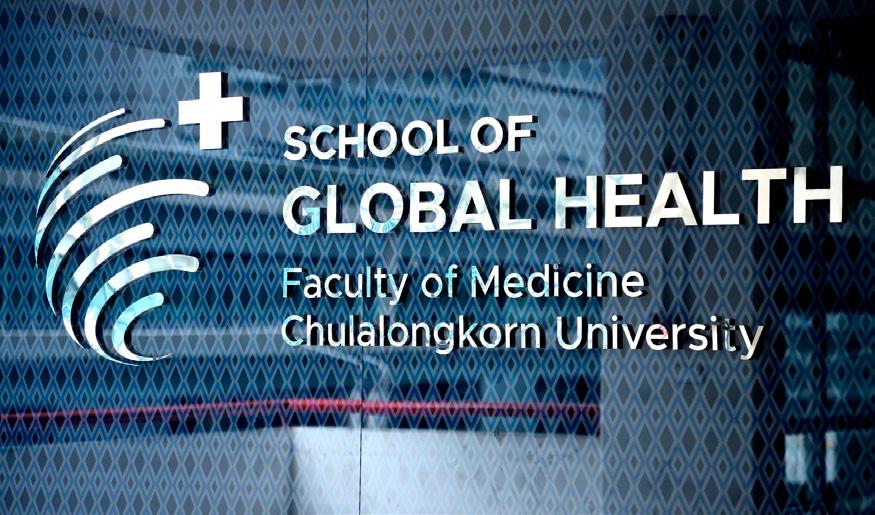

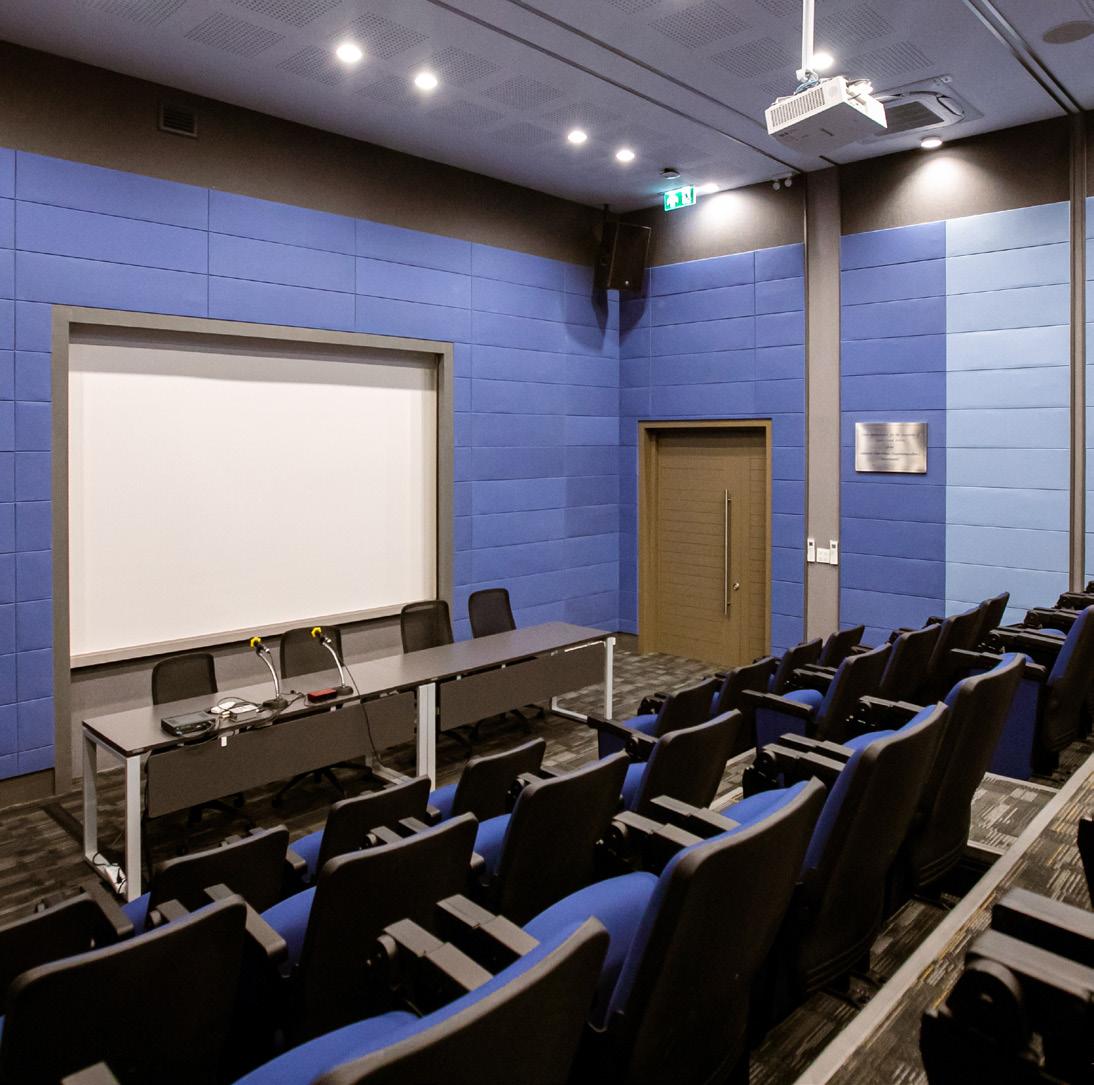
The MDCU International Village promotes internationalization and intercultural competencies in an English-speaking setting. It offers assistance for life in campus, information of International Affairs, survival guides, and resources on Thai language and culture. Special services include English Coaching Clinic, Thai Conversation Class, Taste of Thai cooking class, TGIF Party, and collaborations with external organizations and partners.
It is an ideal place for studying and a popular meeting spot. Each floor consists of computer stations and small group facilities. Twenty-fourhour coffee shop serves every day to enhance our learning capacity.


Location: M Floor, Aor Por Ror Building


Website: http://library.md.chula.ac.th/

Chulalongkorn University Library or Central Library is full with information resources and homegrown co-created contents that cannot be found elsewhere. It offers both large collections of physical books, and digital resources.
Find more at its website:
Operating Hours: Monday to Friday, 8 AM to 5 PM (excluding Thai public holidays) https://www.car.chula.ac.th/ https://www.youtube.com/watch?v=Jh_uomhDxQg
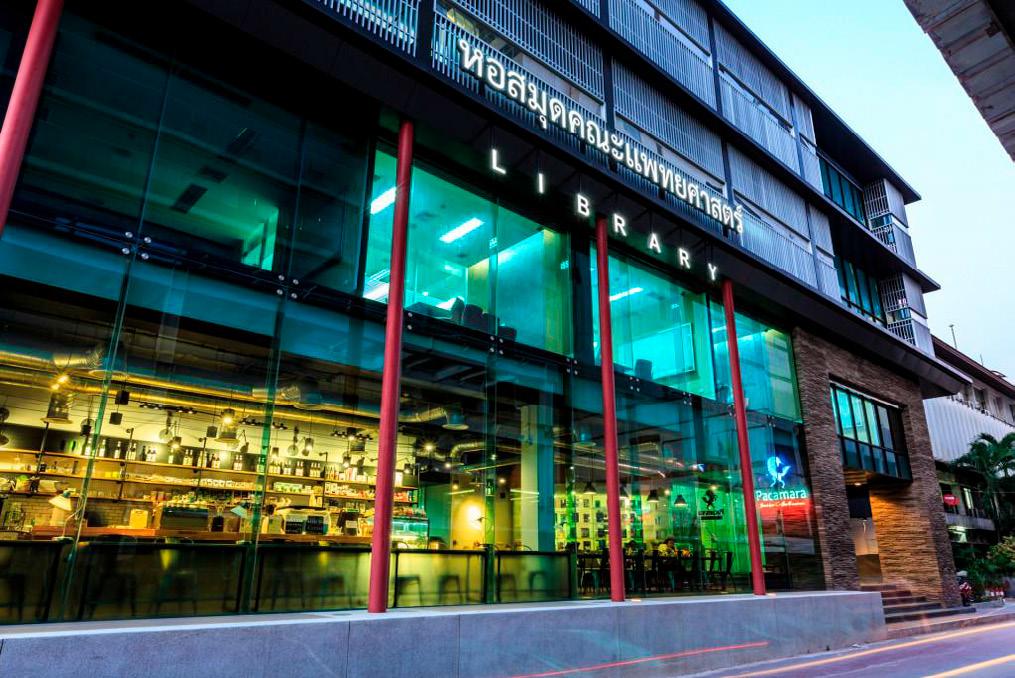
University Library)
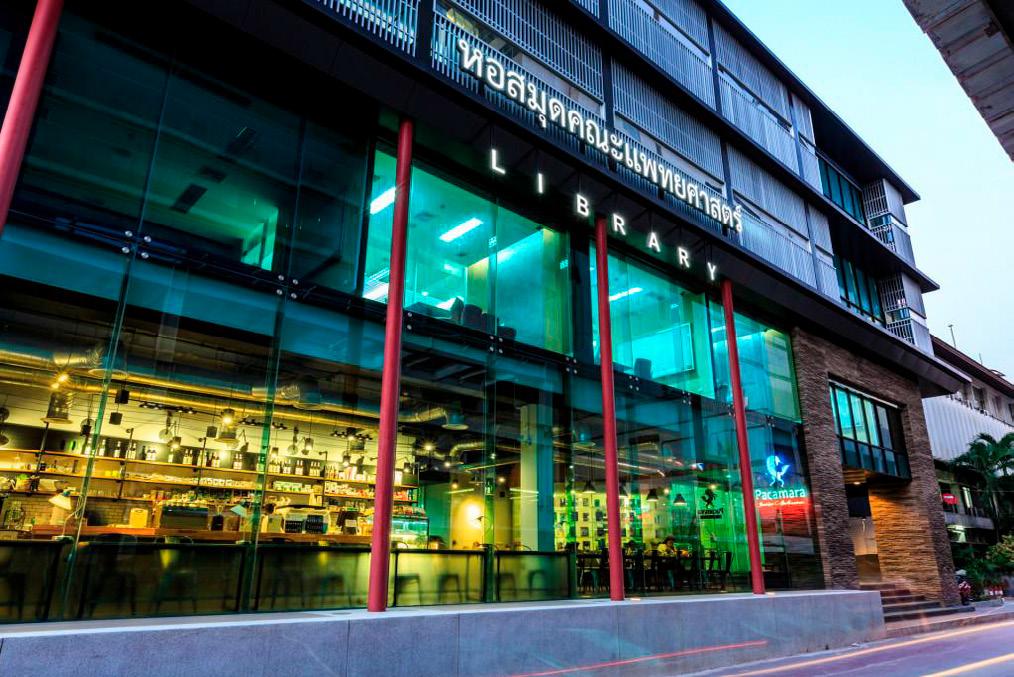
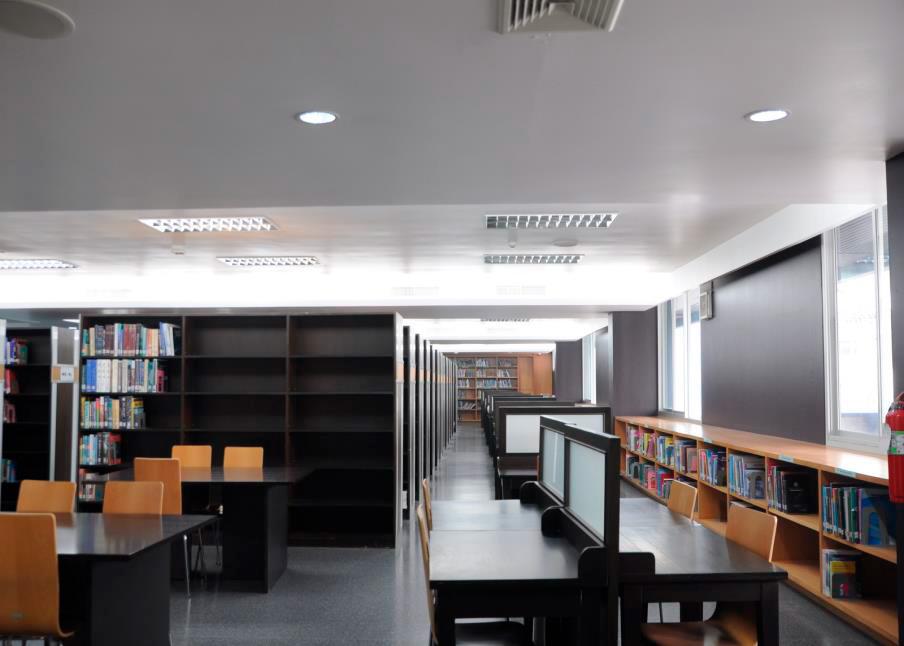
MDCU Library
art library has everything Computer labs, group meeting facilities and even

MDCU’s state-of-the-art library has everything for today ’s medical students. Computer labs, group meeting facilities and even a relaxation station helps promote effective learning for all.


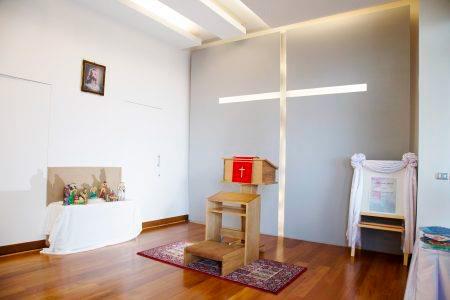



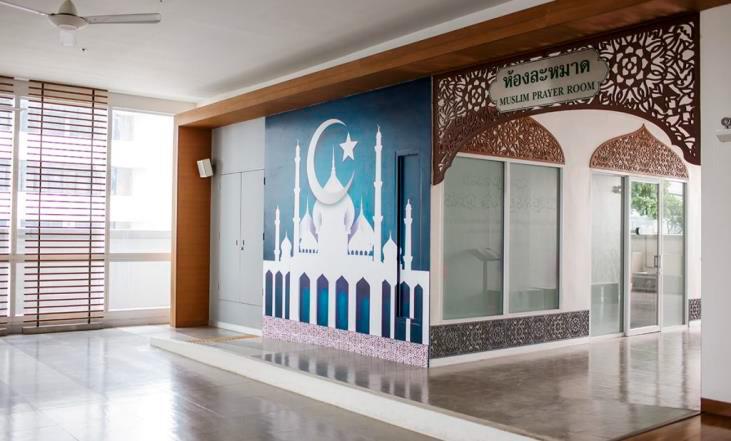



Religious Service at Chulalongkorn University includes Prayer rooms for both Muslim and Christian students. The rooms are dedicated for practice prayer. The prayer space is separated, well decorated and located in calm and peaceful location.
Bhumisirimangalanusorn 14th floor
Location:

Bhumisirimangalanusorn 14th floor
Rommanee Balcony (Rabieng Rommanee), Bhumisirimangalanusorn Building, 14th floor, Faculty of Medicine, Chulalongkorn University.
Chulalongkorn University offers a number of sport facilities for healthiness of students and staff. Students are required to show ID card in order to obtain services.
Customer Relations, CU Sports Center Sport Complex
Tel: 02-218-2874 to 7, 02-218-2848
Website: http://www.cusc.chula.ac.th/
Working hours: Weekday from 08.00 to 19.00 and Saturday from 08.00 to 19.00.
Chulalongkorn Stadium – This standard outdoor stadium, with 25,000 maximum seating capacities, is ideal for football, hockey, rugby, and other outdoor sports. There are synthetic turf and 8-lane synthetic tracks; Sport Library is also available.
Location: Soi Chulalongkorn 9
Open: Monday – Friday from 07.00 to 19.00 except on public holidays
Indoor Sports Gymnasium 1 – Multi-purpose gymnasium, with 4,100 square meters, provides facilities for various types of sports volleyball, for example, basketball, table tennis. For some sports, advance booking is required.
Location: Soi Chulalongkorn 9
Open: - Weekday from 07.00 to 21.00 (badminton court is available until 22.00).
- Weekend from 09.00 to 18.00
* Except on public holidays
Indoor Sports Gymnasium 2 – Table tennis courts, exclusive use for Chulalongkorn students and staff.
Location: Soi Chulalongkorn 26, near CU Sports Complex
Open: - Weekday from 08.00 to 21.00
- Weekend from 09.00 to 18.00
* Except on public holidays
CU Sports Complex – a 5 - storey sport complex, providing various sport services including indoor badminton court, 50-meter outdoor swimming pool, fitness center and aerobic dance room, martial arts training room. Shower room and locker are available.
Location: Soi Chulalongkorn 26
Badminton Court
Swimming Pool
Fitness Center
Martial Arts Training Room
* Except on public holidays
Weekday 07.00 to 21.00
Weekend 09.00 to 18.00
Weekday 09.00 to 20.00
Weekend 09.00 to 18.00
Weekday (662)-256-4475, 256-4663 Ext. 18
Weekend (662)-256-4475, 256-4663
Weekday 09.00 to 21.00


Tennis Courts – There are 10 tennis courts with full lighting; knock boards for self-practice are also available.

Location: Soi Chulalongkorn 9
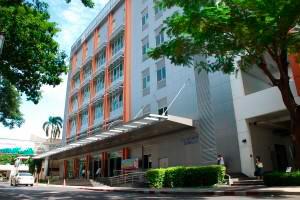
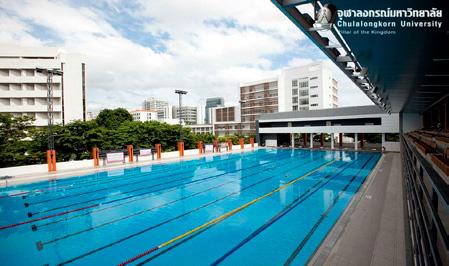
Open: - Weekday from 07.00 to 20.00
- Saturday from 07.00 to 18.00
* Except on public holidays
Tel: 02-218-2839
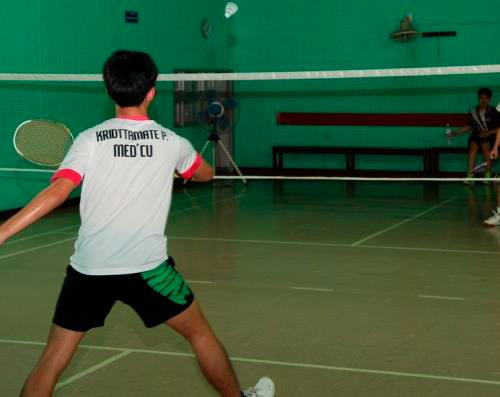
Badminton Court
Opening Hours:
• 1PM-11PM (Mon, Wed, Fri)



Tennis Court
Opening Hours: 9AM-11PM (Mon-Sat)
Chulalongkorn University provides free shuttle bus service for students, faculty and staff. The shuttle bus service operates all routes on Monday to Saturday from 7AM – 7 PM.
• 7PM-11PM (Tue, Thu)
• 12PM-11PM (Sat)
• 9AM-11PM (Sun & Holidays)
Only Bus No.1 and 2 are available on Saturday.
You can find Bus routes and MAP at https://www.chula.ac.th/en/about/green-university/cu-shuttle-bus/


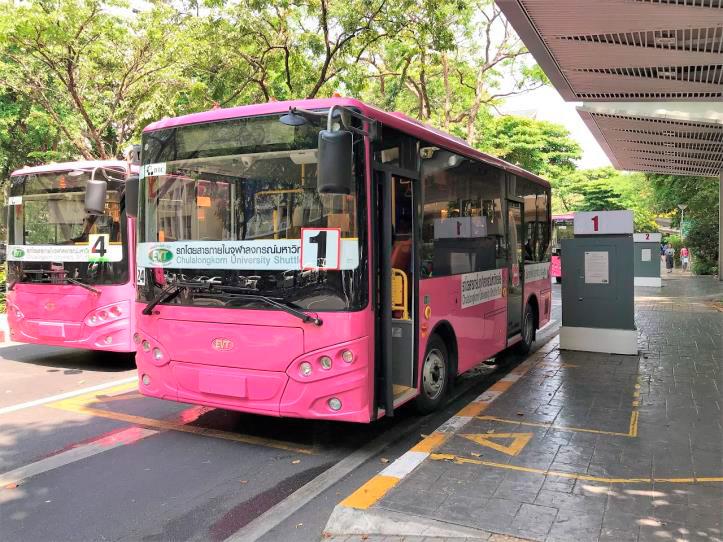


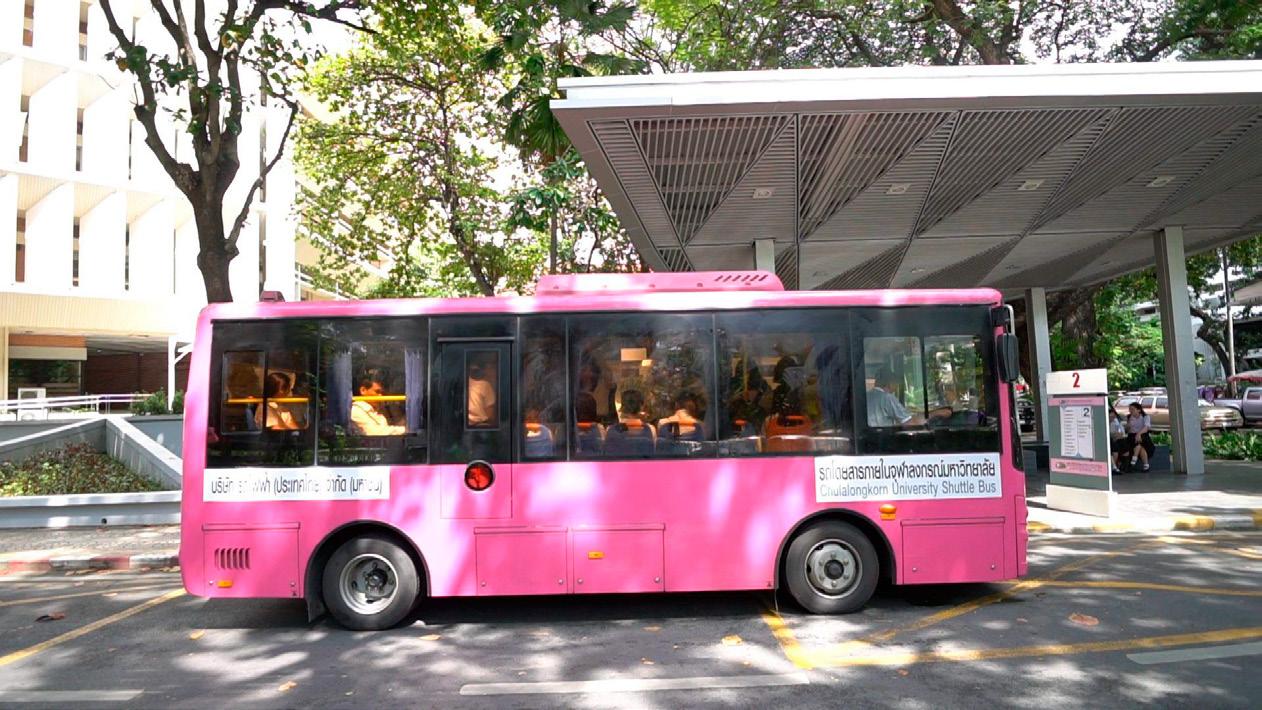

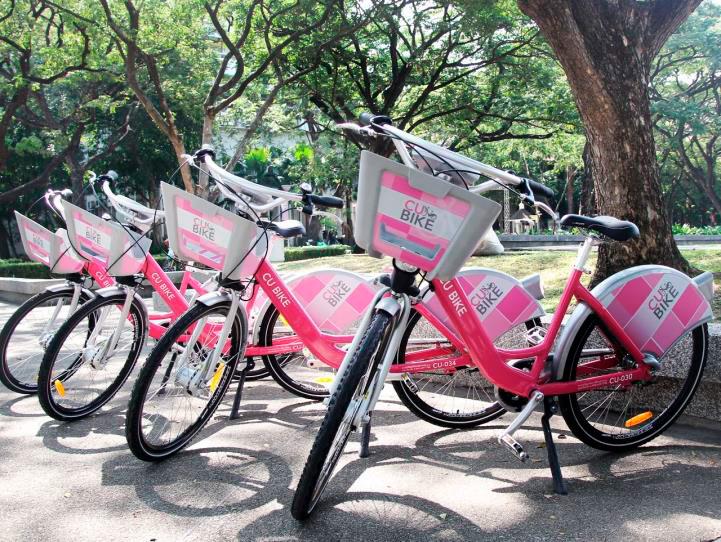



It is the first enormous piece of green infrastructure for the city of Bangkok, designed to mitigate detrimental ecological issues and add much-needed outdoor public space to the grey city. The park is an 11-acre plot of land and 1.3-km. avenue extending from its core campus at the heart

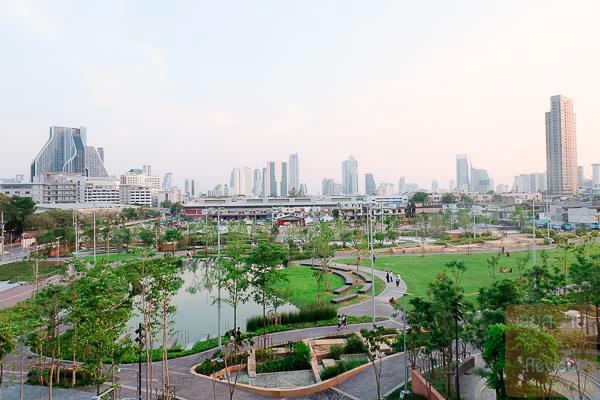
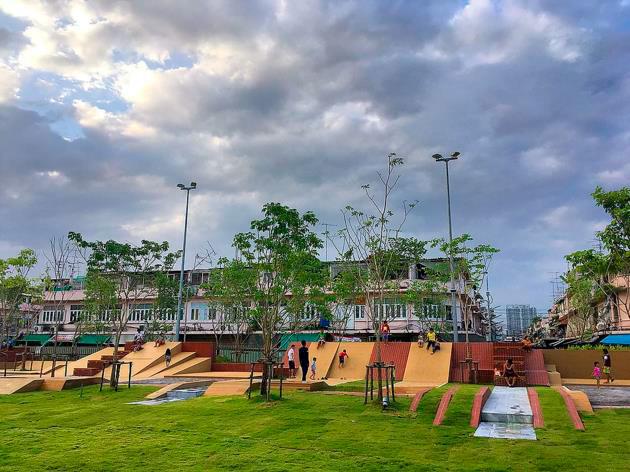






The Faculty and the University offer a number of financial support for both local and international students. The providing scholarships are as followings, they are subjected to be changed depending on the announcement of the Faculty and the University. For more details, please contact MDCU office, your program coordinator or visit Grad School website. https://www.grad.chula.ac.th/en/index.php
Scholarship
Educational Scholarships
Scholarship Program for ASEAN and NON–ASEAN Countries Depends on the University in each year
C2F Scholarship (only Ph.D.) Depends on the University in each year
Research Scholarships
The 90th Anniversary of Chulalongkorn University Scholarship Depends on the University in each year.
Ratchadapisek Somphot Endowment Fund Depends on the University in each year.
Details of Extramural Grants or External Funding Scholarships are available at http://grad.md.chula.ac.th/scholarship.php and at https://www.research.chula.ac.th
All Chulalongkorn students get university email (student id@student.chula.ac.th) which comes with:
- 15 GB of Google Drive and G suite
- 1 TB of One Drive and Office 365
- Zoom licensed account
- Access to download necessary software like Microsoft Windows 10, SPSS programs, MATLAB Program, Adobe programs, Endnote, Turnitin.
Please check for more detail: https://www.it.chula.ac.th/all-services/
Office of International Affairs and Global Network provides student support service including visa support services. For further information, please contact: Office of International Affairs and Global Network.
Chamchuri 10 M2 floor
Working hours: 09.00 - 11.30 / 14.00 - 16.30
Tel: 02-218-3126
E-mail: int.off@chula.ac.th
Website: https://www.inter.chula.ac.th/
Chulalongkorn University provides student support service as in the name of “CU Student Corner”. The service is to support students for their well-being, internship, and job hunting support. For more information, please visit:
Website for CU Student Corner: https://th-th.facebook.com/borikarnnisitchula/
Working hours: Monday - Friday, from 8:00 a.m. - 5:00 p.m.
Tel: 081-453-3233 or 0-2218-7077
Address: Sala Phra Kieo, Chulalongkorn University Phayathai Road, Pathumwan, Bangkok 10330 Thailand

All international students are required to hold a student ID card or International ID card in order to access the University facilities and discount on some services.
Degree/non-degree international students registered in the course as a Full-time student will get student ID card which is issued by the Office of Registrar. Part-time students will be eligible for an International ID card which is issued by the Office of International Affair.
For more information and Benefit of Card Holder, please check: https://www.inter.chula.ac.th/one-stop-service/campus-life/cu-id-card/
The Health Service Center provides medical consultation and treatment for CU faculty members, students and employees. It has been in service for over twenty years. The center is under supervision of physicians from Chulalongkorn Hospital every day.


floor of the Chamchuri 9 Building
PHYSICAL DEVELOPMENT
Service Hour: 08.00 – 16.00 from Monday to Friday without lunch break.
Tel: 02-218-0568
Website: http://www.cuhc.chula.ac.th/en_US/Health Service
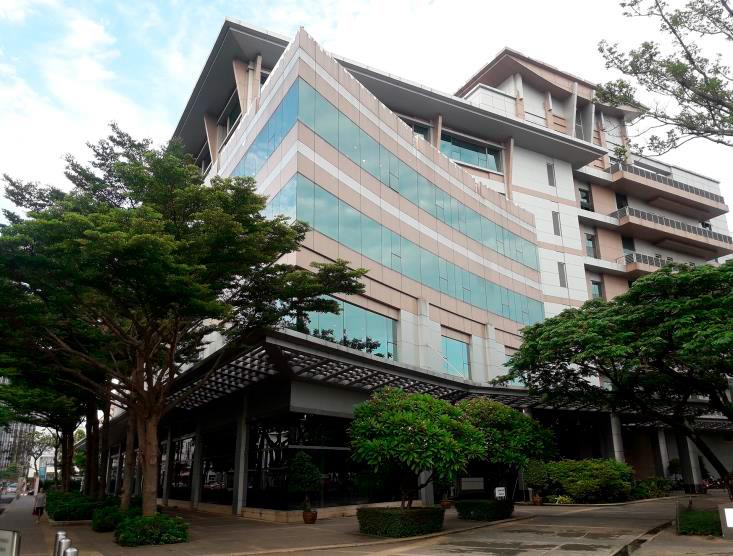
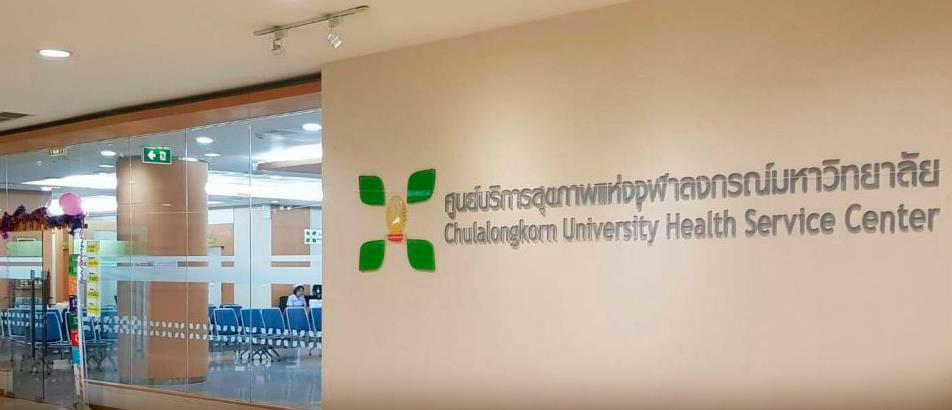
Chulalongkorn University Health Service Center
Chamchuri 9 Building
The physician will transfer a patient to hospital in cases where more advanced treatment is needed or when the patient requires medication which is not available at the Health Service Center. The details are as follows:
1. Transferring form will be issued by the in-charge physician. Once the form is obtained, it will be submitted to Chulalongkorn Hospital, the Thai Red Cross Society or any other hospital depending on the availability of a physician to treat the patient as stipulated on the form. The patient is responsible for the payment.
2. In case of health insurance compensation claim, the patient is required to submit medical certificate and the receipt to the insurance company. The procedures and documents required depend on each company, thus, it is strongly recommended that the patients study their own insurance policy.
The University maintains life and accident insurance for all graduate students registered in the Registrar Department system, for which students are not required to make additional payment as the premium is included in the tuition fee. All students are covered in case of injury or accidental death throughout their enrollment at the University.
- August 1st – July 31st (24-hour, worldwide)
- In cases where a student leaves the University before the end of coverage period, the student remains eligible for benefits through the end of the coverage period.
The plan covers the actual charge of medical treatment in both public and private health facilities as long as it does not exceed
- 40,000 Baht per accident for an accident occurring on campus or during participation in off-campus University activities including sports competitions on behalf of the University.
- 30,000 Baht per accident for accidents occurring off-campus.

Students must pay for their medical treatment in the first instance and then their reimbursement request for out-of-pocket medical expenses must be submitted to the CU Student Corner in the Office of Student Affairs, located on the lower ground floor of the Chulachakrabonse Building. The claim should be supported by the following documents:
1. The original medical certificate,
2. The original itemized bills,
3. A copy of their bank passbook.
The documents will be collected by the insurance company on the 1st, 10th and 20th of each month. The sum reimbursed will be transferred directly into the students’ bank account after the review process has been completed and the request has been approved.
Exclusions
The plan does not cover or provide benefits for:
1. Private nursing charges,
2. Ambulance or transportation services in non-emergency cases,
3. Medical supplies for external use (e.g. orthotics and prosthetics, canes, arm slings, conforming gauze bandages or back braces),
4. Telephone call charges,
5. Newspapers,
6. Other services not related to the medical treatment.
Death and dismemberment benefits
1. Death (regardless of cause) – 10,000-Baht compensation,
2. Accidental death – 210,000-Baht compensation,
3. Accidental dismemberment:
Educational Scholarships
Loss of both hands, severed at or above the wrists
Scholarships
Loss of both feet, severed at or above the ankles
Loss of a hand and a foot, severed at or above the wrist or the ankle
Loss of a hand, severed at or above the wrist, and loss of sight in one eye
Loss of a foot, severed at or above the ankle, and loss of sight in one eye
Loss of sight in both eyes
Loss of a hand, severed at or above the wrist
Loss of a foot, severed at or above the ankle
Loss of sight in an eye
Loss of a thumb, at or above the first joint from the tip, or an index finger, at or above the second joint from the tip
Baht
Baht
Baht
Baht
Baht
Baht
Baht
Baht
Baht
Baht
Baht
Baht
4. Repatriation of remains – compensation for the actual costs incurred but not exceeding 10,000 Baht per case
All international students of the University are required to join group health insurance to ensure well-being of students while studying with the University. In addition, all students are required to have their health insurance covered at least 2,000,000 Baht/year. The coverage of the Group Health Insurance is shown below:
1
2.1
Any causes of death, 24/7, worldwide. Exclusion: Suicide during the first policy year, or murdered by beneficiary.

2.2
a. Room & Board per day (Max. 31 days per disability)
I.C.U. admission (Max. 7 days per disability) Overall limit when combined with room and board benefit above is ..days
b. General Hospital Expenses per disability 16,000
- Include OPD follow-up treatment within 31 days after the hospital discharge date 1,000 -
- Ambulance (Max. per illness / accident, inclusive of clause b.)
c. Surgical Benefit per disability (According to the Surgical Schedule) 16,000
d. In-Hospital Physician Visit per day (Max. 31 days per disability)
e. Emergency Accidental OPD Treatment per each accident (Max. per accident) inclusive of clause b. For treatment within 72 hours from time of accident, including OPD follow-up treatment within 31 days from the day of accident. 2,000
f. Specialist Consultation per disability Inclusive of clause b. or c., whichever the case may be. 2,000
or OPD treatment (Limit 1 visit /day, max.30 visits /policy year)
If the insured member suffers from an illness or injury and doctor inferred that he/she has to stay in the hospital as in-patient not less than 6 hours continuously which must be registered as an in-patient who is eligible to receive coverage, the company would reimburse for daily medical benefit after the insured member had received full compensation from Social Security Fund, Universal Health Coverage or Protection for Motor Vehicle Victims Act.
Reimburse benefit equal to Room & Board Expenses in accordance with the actual number of days of hospitalization
Chulalongkorn University International House (CU iHOUSE International) is designed for CU international students, international faculty members and CU Thai graduate students.
- 26 storeys, 846 units
- on-campus residence
- Monthly / Daily rents
- 24-hour receptionist + security services
- free WIFI
- cable TV
- room cleaning service (twice a month)
- free shuttle bus service to other areas of the University
Address: 268 Chulalongkorn Soi 9, Charasmuang Road, Wangmai, Pathumwan, Bangkok, Thailand.
Close to: BTS – National Stadium Station and Siam Square Station, MRT - Samyan Station
Tel 02-217-3188 or 066-095-1670
e-mail: book@thecuihouse.com
facebook facebook.com/CUiHouseBangkok
website http://www.pmcu.co.th/?page_id=9795
Chulalongkorn University is a centre of lifelong learning that supports opportunities for lifelong, continuous quality learning and self-development for its students, staff, alumni and the general public. It serves as a secure, important body of knowledge for communities, society and the nation amidst global change.
Visit: https://lifelong.chula.ac.th/


With the determination to drive the medical knowledge through innovation and modern technology, the faculty of medicine, Chulalongkorn University together with King Chulalongkorn Memorial Hospital has launched “Med U More”, an online platform that provides more than 500 courses, academic conferences and seminars. The goal is to allow everybody to study whenever and wherever they want.
For more information, please visit https://www.medumore.org/
We believe that anyone can learn. Chulalongkorn University provides free online courses for everyone to develop and learn skills that you are long interested. Courses provided on MOOC includes Language, IT/ Data/ Technology, Management, Art and Self Develop, and Health. Please be informed that most of the courses provided on the website are in Thai.
Visit: https://mooc.chula.ac.th

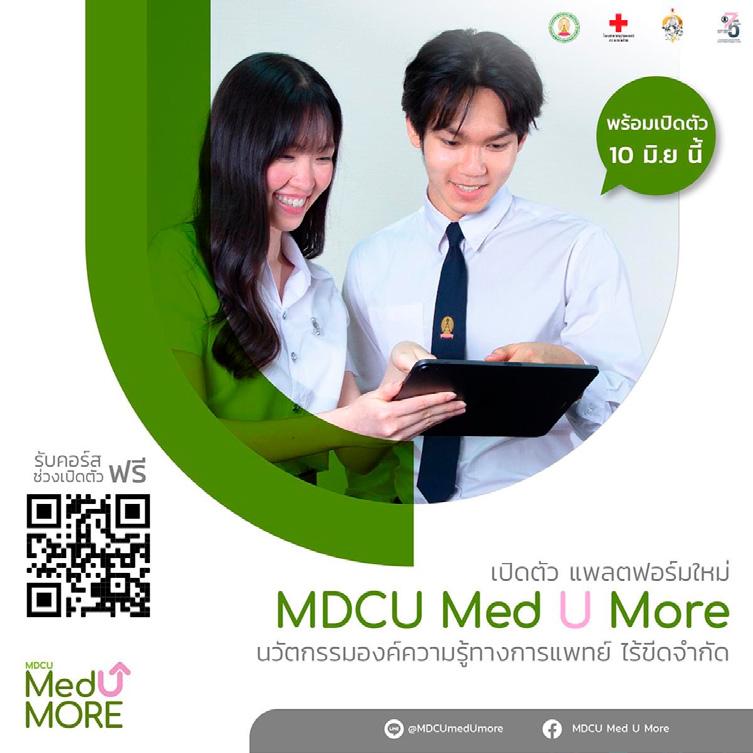
CourseVille is supported by the Learning Innovation Center of Chulalongkorn University aiming at developing and providing a high-quality online Learning Management System (LMS) service to the general public. The ultimate goal of CourseVille is to become a leading free online tool that enhances education experiences of learners and teachers worldwide.
Visit: https://www.mycourseville.com/
MDCU international students can apply for Thai courses, provided by Faculty of Arts, Chulalongkorn University. There are wide range of courses, from beginner to advance levels, to apply.
Check the Center for Thai as a Foreign Language (CTFL) for more information at http://www.arts.chula.ac.th/CTFL/
• Non-Immigrant ED Visa is the only visa for foreigners temporarily staying in Thailand in educational purposes.
• Tourist Visa (TR) upon arrival: a stay of 60 days will be granted to anyone entering Thailand as a tourist.
• Tourist Visa Exemption (Phor30, ผ.30 or Phor90, ผ.90): entering Thailand for tourist purpose not exceeding 15 days; extension of stay and changing visa type are not allowed.
For students holding any visa other than Non-Immigrant ED-Visa must contact the program officers immediately to change the visa type.
• This visa is for any foreign national who intends to stay in Thailand for the purpose of attending courses both Full-time and elective courses.
• For the first arrival, students will receive a 90-day permit and are required to extend their permission to stay after 90 days of their arrival at the Immigration in person.
• Within 90 days, you are required to register, submit tuition fee and extend your visa. You need a confirmation letter from the University to extend full period of study time.
• Please check the validity of your visa and get it renewed before the expiry date. You are welcome to contact us in order to request an extension letter before going to the Immigration Bureau, immigration Division 1.
• Please keep this matter in mind that all the procedure requires a certain amount of time, so the Faculty highly recommends you to contact us 30 days before the expiry date.

Before your visa expires, please contact your program with your passport and other required documents, to request a letter for an extension of stay. This process can take up to 7 working days or more.
• Application form (TM.7), filled out and signed by the student
• Copy of Passport, first page and the page showing visa expiry date (stamping page)
• 1 passport-size photo (4x6 cm.)
• 1,900 Baht Fee
• Departure card (TM.6)
• Letter of an extension of stay from the University, valid for 45 days after the signed date
• A copy of transcript issued by the Office of the Registrar, CU
• A study hour report from the Faculty, signed by the Dean
• Additional criminal record verification and accommodation contact (if required by the Immigration Bureau)
Note: A fine of 500-Baht per day will be applied if a visa extension does not meet the expiry date deadline.
Ultimately, students are responsible for ensuring that they renew their visa before the expiration date. Overstaying without a valid visa is a serious issue that will result in daily fines and possible deportation. This lapse will be stamped on the students’ passport and become part of their record at the Immigration Bureau. If the overstay exceeds 40 days, the student must leave the country.
Immigration Division 1, Immigration Bureau
Chalermprakiat Government Complex B Building, 120 Moo 3, Chaengwattana Rd., Soi 7, Toongsonghong, Laksi, Bangkok. 10210
Website: https://bangkok.immigration.go.th/en/home_en/ Call: 1178 or 02-141-9889
The 90-day notification is the mandatory requirement for any foreigners, regardless on your visa type, to contact Immigration Bureau every 90 days in order to update their current address. It is not a visa extension. It is free of charge but you are required to show up in person at the Bureau. It is recommended for students to notify the immigration 7 days before the date end up or to notify them as the date stated on the appointment. If you miss the date, you will be fined 2,000 Baht per day and risking visa cancellation if it is happening more than once or twice.
Students holding a one-year extension visa who plan to leave Thailand need to apply for Re-entry Permit before their departure, the permission can be single or multiple re-entry. The Re-entry Permit can be obtained at the local Immigration Bureau.
• Application form (TM.8), filled out and signed by the student
• Copy of Passport: the first page (with your information), the page showing the most recent entry visa page, and the page showing “Kingdom of Thailand label (stamping page).
• 1 passport-size photo (4x6 cm.)
• 1,000 Baht for a single entry or 3,800 Baht for a multiple entry permit
Note: If you forget to lodge the Re-entry Permit, your student visa will be invalid and you will have to go through the whole process of getting the proper student visa at a Thai Embassy or Consulate outside Thailand.

Some little things that you should know while living in Thailand.
• Public displays of affection between men and women may be frowned upon.
• Don’t be surprised if you are addressed by your first name - as for instance, Mr. Bob or Miss Mary - instead of by your surname. This is because Thais refer to one another in this manner, usually preceded by the honorific Khun instead of Mr., Mrs. or Miss.
• Avoid touching anyone’s head especially that of an elderly person.
• In Thailand, the foot is the lowest part of the body. Do not point at people or things with your foot. When sitting, do not place your feet on a table.
• Remove your shoes when entering a house or certain building on the temple grounds.
• Avoid pointing your finger at other people.
Medical services
• Bangkok has several large hospitals with foreign and/or English speaking doctors and medical staff. If traveling outside Bangkok, you may find it difficult to get an English-speaking doctor unless you are in a large city.
• In general, the tap water is clean enough for daily use, but don’t drink it unless you can be sure that it has been boiled. Drinking water can be bought at any shop or street stall that sells refreshments.
Chulalongkorn University

Faculty of Medicine (662)-256-4183 prmdcu@gmail.com
Graduate Affair Faculty of Medicine (662)-256-4475 grad.mdcu@gmail.com
International Affairs Faculty of Medicine (662)-256-4288 chulamed.international@gmail.com
Graduate School Chulalongkorn Universit (662)-218-3501 grad@chula.ac.th
Chulalongkorn University (662)-215 3555 pr@chula.ac.th
Office of the Registrar Chulalongkorn University (662)-218-0016 webreg@chula.ac.th
Office of Information Technology Chulalongkorn University (662)-218-3314 help@chula.ac.th
Office of Academic Affair Chulalongkorn University (662)-218-0201 N/A
Office of International Affairs and Global Network Chulalongkorn University (662)-218-3130 int.off@chula.ac.th
For other departments/ work units of Chulalongkorn University, please see https://www.chula.ac.th/contact/departments/
MDCU Map – How to reach the Faculty: https://www.md.chula.ac.th/wp-content/uploads/2016/02/map.png
Inside Faculty and Chulalongkorn Hospital Map: https://qscbc.org/contact/
Chulalongkorn University Map: https://www.chula.ac.th/wp-content/uploads/2017/12/CU-map-2015.pdf
Chula POP Bus Routes: https://www.chula.ac.th/wp-content/uploads/2018/02/cu-shuttle-bus-route-2560x2440.jpg
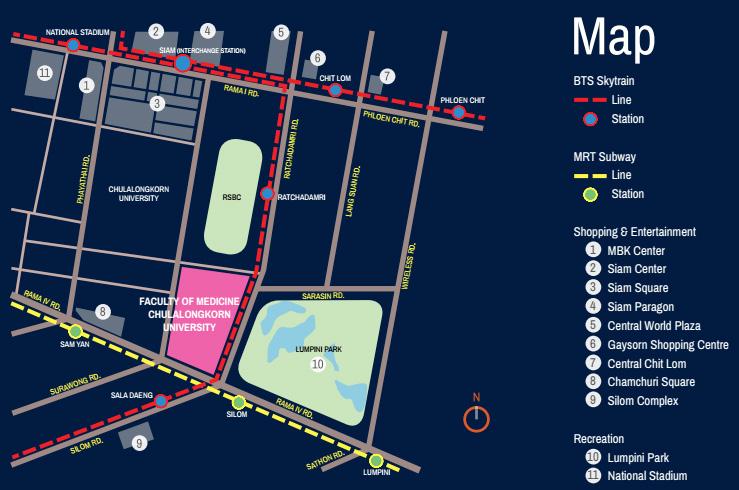
• Ma Halal Food
https://www.wongnai.com/restaurants/452299Tt-
Location: Or Por Ror Building, inside Chulalongkorn Hospital
• Shabeebee House
https://www.shabeebeeroticha.com/
Location: Chula Soi 12
• Fada Coffee & Tea
?ref=ct
https://www.facebook.com/FadaCoffee/?fref=mentions&__tn__=K-R
Location: Phaya Thai
• Vegie House Restaurant
https://th-th.facebook.com/VegieJ
Location: Chula Soi 50
• Koko vegetarian Restaurant
https://www.wongnai.com/restaurants/4189JI-koko-โคโค-siam-square-soi3
Location: Siam Square Soi 3
* The content in this student handbook is only some parts of the full regulation.
Chulalongkorn University
Number 9. The Graduate School operates a credit system. The academic year is divided into two semesters, or three terms or any other period divisions as may be prescribed by the University Council.
Number 10. Academic year is divided into two types, as follows:
(1) The bi-semester academic year is divided into two semesters: first and second semesters. There may also be an additional summer session after the conclusion of the second semester.
(2) The tri-semester academic year is divided into three semesters: first, second and third semesters.
For the bi-semester academic year, each semester consists of no less than 15 weeks, while the summer semester duration must not be less than 6 weeks but not greater than 8 weeks. The number of class periods for each course subject in the summer semester must be equal to those of a regular semester.
For the tri-semester academic year, each semester consists of no less than 12 weeks, and each course must be held as the criteria stated on Number 11 as the class period for 1 semester must be equal as the bi-semester system and 1 credit of tri-semester system is equal to 1 credit of bi-semester system.
Number 11. Semester hour units representing the volume of academic work shall be referred to as “Credits”. The number of credits granted for each course subject is determined as follows:
(1) Theory-based courses entailing at least 15 hours of lectures or seminars over one full semester shall yield one credit.
(2) Laboratory-based courses entailing at least 30 hours of training or laboratory sessions over one full semester shall yield one credit.

(3) Training or fieldwork practice entailing at least 45 hours over one full semester shall yield 1 credit.
(4) Independent study or thesis/dissertation work entailing at least 45 hours of research over one full semester shall yield 1 credit.
In the case of a different academic system, the criteria for and details about the calculation of credits and their equivalent values in the bi-semester system shall be spelled out in the documents of the Program concerned.
Number 12. The subjects specified in the curriculum as courses that students must study and pass examinations in order to receive an “S” grade but do not merit a grade to be accumulated for the overall credit requirements in the program shall be referred to as “Non-Credit Courses”.
Students who receive a “U” grade in a non-credit course, as explained above, must re-register for that course.
Number 13. “Credits studied” refers to the number of credits for the courses students have registered for and are divided into three types, as follows:
(1) “Aggregated Credits per Semester” means the total number of credits for every subject taken and students receive the letter grades of A, B+, B, C+, C, D+, D and F in a particular semester.
(2) “Overall Cumulative Credits” mean the total number of credits for all subjects which students have gained every time they receive grades of A, B+, B, C+, C, D+, D and F at the conclusion of a semester. Acceptance of credits from re-registration for any one self-same subject shall be subsumed under this regulation.
(3) “Credits Completed” means the number of credits for subjects students shall have passed at grades A, B+, B, C+, C, or S. In cases where students have passed any course more than once or where they have passed any additional course specified as equivalent to the course already completed, only the number of credits gained at the first pass shall be awarded.
Notwithstanding this regulation, students may, with the permission of the Graduate Studies Committee, re-register and have the credits for both subjects in question validated, provided that the additional subject’s content is significantly different from that of the previous one.
Number 14. “Period of Study” means a total period of time which students spend on studying and producing academic works, as required by the curriculum, namely taking courses, conducting research, writing up a thesis or dissertation, as well as having his/her thesis published.
The Period of Study, as defined above, shall commence from the date of first registration for graduate study in the program and finish when students pass the examinations and complete all of the Program’s requirements.
Number 15. The period of study for a Graduate Diploma and an Advanced Graduate Diploma shall not exceed that determined by the Policy Board.
Number 16. The maximum period of study for a master’s degree shall be 4 academic years.
Number 17. The maximum period of study for a doctoral degree shall be
(1) 6 academic years with regard to candidates who hold a master’s degree, (2) 8 academic years with regard to candidates who hold a bachelor’s degree.
Number 18. The period of study for the foregoing programs with regard to regular part-time students shall not be 1.5 times longer than the duration specified on Number 15, Number 16, or Number 17 considered on a case-by-case basis.
Number 19. Courses are conducted in English.
Students must write their theses/dissertations or independent study in English. The regulation about language shall be announced before an application to the Program takes place.

Number 21. For the Graduate Diploma Program and the Advanced Graduate Diploma Program, each of them consists of courses carrying a minimum of 24 credits in total throughout the entire duration of the course.
Number 22. The Master’s Degree Program consists of a minimum of 36 credits in total throughout the entire duration of the course. Students can opt for one of the following two plans:
(1) Plan A: this is a research-based program plus thesis.
(2) Plan B: this is a coursework-based program. No thesis is required. Any Departments offering Plan B are required to offer Plan A as well, so that students can make their choices. On the other hand, the Department offering Plan A for its master’s degree program may choose to offer Plan B as well. This shall comply with the criteria set up by the Academic Policy Board.
Number 23. Plan A of the Master’s Degree Program is divided into two formats.
(1) “Plan A1”: this consists of a minimum of 36 credits of Thesis
(2) “Plan A2”: this consists of a minimum of 12 credits of Thesis and a minimum of 12 credits of coursework. The combination between them, however, must result in a minimum of 36 credits in total.
Number 24. Students who follow Plan B of the Master’s Degree Programs (see Number 22 (2)) in the scientific area of study must complete 6 credits of Independent Study while those in the Program in other fields are required to complete not less than 3 credits and not more than 6 credits of Independent Study.
Number 25. The Doctoral Program is a research-based degree leading to a dissertation. The doctoral dissertation is expected to contribute to the advancement of knowledge and must meet the most rigorous academic standards. The doctoral program is available to students in two schemes of study.
(1) “Scheme 1” is a research-based program leading to a dissertation. This type of scheme consists of two formats:
(a) “Scheme 1.1”: Candidates who have a master’s degree shall produce a dissertation worth not less than 48 credits.
(b) “Scheme 1.2”: Candidates who have a bachelor’s degree with Honors shall produce a dissertation worth not less than 72 credits.
(2) “Scheme 2” is a research-based program, combining coursework with research leading to a dissertation. This type of scheme consists of two formats:
(a) “Scheme 2.1”: Candidates with a master’s degree shall take courses of at least 12 credits in total and produce a dissertation worth not less than 36 credits.
(b) “Scheme 2.2”: Candidates with a bachelor’s degree shall take courses of at least 24 credits in total and produce a dissertation worth not less than 48 credits.
Number 26. As for the Continuing Program, it offers all of the above mentioned schemes of the Doctoral Degree Program i.e., Schemes 1.1, 1.2, 2.1 and 2.2 while only Plan A of the Master’s Degree Program, consisting of both Plans Al and A2, is available.
Number 27. Students may take courses or be involved in other approved academic activities on a non-credit basis, subject to the specifications of the Program Committee.

Number 28. Candidates for each Program must complete their studies from the programs accredited by the Ministry of Education, have the qualifications required by each Program and other qualifications prescribed by the Program Committee.
Prescription of other qualifications, as mentioned above must be approved by the faculty Board, and shall be considered annually.
Number 29. Candidates for the Graduate Diploma Program must hold a bachelor’s degree, or equivalent.
Number 30. Candidates for the Advance Graduate Diploma Program must hold a bachelor’s Degree from six-year program, or master’s degree, or equivalent. However, for a Specialized Vocational Program, a candidate with a bachelor’s degree may be deemed qualified for admission.
Number 31. Candidates for the Master’s Degree Program must hold a bachelor’s degree, or equivalent.
Candidates for Master’s Degree Program in Plan A1 must graduate in the same field of study with the applying program, or any field of study that the Program Committee stipulated and must be announced before the admission, except for the approval is granted by the Program Committee on a case-by-case basis.
Number 32. Under Regulation Number 66 and Number 97, candidates for Doctoral Degree Program must hold one of the followings:
(1) master’s degree, or equivalent;
(2) bachelor’s degree, or equivalent in the same field of study with the applying doctoral degree
For Continuing Program, candidates for both master’s and doctoral degree must have the aforementioned qualifications, or as on Regulation Number 31. Language requirement must be passed for the master’s degree as it is stipulated by the Academic Policy Board.
Number 33. A candidate cannot re-enroll to the same field of study if his/her status as a graduate student once is terminated due to either he/she has completed the Period of Study but has not graduated, or his/her GPA is below the criteria, except for the discretion of the Graduate Studies Committee is granted.
Number 39. Successful applicants for any level of diploma or degree will have the status of student in any of the following categories:
(1) Conditional student
(2) Regular student
The Faculty Board may allow an applicant to be admitted as a conditional student on a trial basis in certain programs except for areas of study in the A (1) type of plan A in the master’s program and scheme 1 of the doctoral program.
Number 40. Students of a Continuing Program shall be indicated as a PhD or MA students depending on the student’s qualification stated in on the day when they first enroll in the program. However, the students can submit the petition to enroll in doctoral or master’s degree as specified in the regulations in Part 1 of Section 8.
Number 41. Those who enter a program of study but will not receive a diploma or degree at whichever level are divided into three categories
(1) visitors
(2) research students
(3) inter-university students program, or any field of study that the Program Committee stipulated with the academic record not less than honor’s degree.

Admission of the students in the above categories must be approved by the Faculty Board.
Number 42. Consideration may be given by the Program Committee to those other than graduate students of Chulalongkorn University to be visitors in certain subjects. However, they are allowed to register no more than 6 credits of coursework per semester and must complete the registration at the Office of Registrar within the period of time determined by the Office of the Registrar.
Number 43. Consideration may be given by the Program Committee to accept a graduate student from another program, or another institution within Thailand or abroad, to perform the research on a specific topic in one particular semester or at a certain time as deemed appropriate. The Program Committee may revoke the status of a research student, in case where the student shows inadequate progression of the research or the student has been found guilty of misconduct. The acceptance of a research student and revocation of the status of a research student must be reported to the Graduate School. In cases where a research student comes from overseas, the Graduate School shall further notify the matter to the Office of International Affairs.
Number 44. Consideration may be given by the Program Committee to accept graduate students from another institution within Thailand and abroad as an inter-university student in order to register for certain course(s) so as to transfer the credit(s) and grade(s) to the program of the institution of their affiliation. The registration must be done at the Office of Registrar within the period of time determined by the Office of Registrar.
Number 45. Those who are admitted to the University as a student must register for their entry to the University by presenting the documents and evidence prescribed by the Office of Registrar, for their courses of study and pay tuition fees as well as, if applicable, other fees.
Number 46. Registration for courses of study is divided into 2 categories:
(1) Regular registration takes place before the beginning of each semester.
(2) Late registration takes place within the first two weeks of the semester or the first week of the summer semester.
The registration schedule, date, time and method shall be in accordance with those announced by the Office of Registrar.
In cases where exceptional circumstances render it impossible for a student to register within the stipulated period of time, special permission may be granted on a case by case basis by the Director of the Registrar’s Office.
Number 47. Registration by a regular student is categorized according to his/her student status:
(1) Full-time students must register no more than 15 credits for coursework and/or thesis in each semester.
(2) Part-time students must register no more than 6 credits for coursework and/or thesis in each semester.
Students can register no more than 6 credits for coursework and/or thesis for the summer semester.

Registrations that do not comply with the above-mentioned stipulation can be conducted only when they gain approval from the Director of the Office of Registrar.
Registration for courses at the undergraduate level, which are stated in the Graduate School Announcement, shall require an assessment system of S (Satisfied) or U (Unsatisfied) grades only.
In cases where a regular student needs to register for a course at the graduate or undergraduate level in order to gain a more solid basis in his/her studies and the said subjects are assessed as S (Satisfied) or U (Unsatisfied) he/she is required to register at least 3 credits for a required subject at the graduate level in the program of study, except the student has passed all the required courses of the program or the student registers in non-coursework program.
In case a student in doctoral program who has registered all of seminar courses as stipulated and has not graduated, he/she has to register Doctoral Dissertation Seminar course in all semesters until graduation.
Number 48. Registration by a conditional student is categorized according to his/her student status:
(1) Full-time conditional students - In the first semester the student must register for no fewer than 6 credits of required courses at the graduate level in the program of study he/she has enrolled in.
(2) Part-time conditional students - In the first semester the student must register for no fewer than 3 credits of required courses at the graduate level in the program of study he/she has enrolled in.
The courses, which the conditional students must register in the first semester, shall be determined by the Program Committee and these credits must be computed for a grade point average:
At the end of the first semester in which the student has registered for courses, a conditional student must obtain a GPA of no less than 3.00 and the S (Satisfied) grade in non-credit courses so that his/her status can be changed to that of a regular student.
Number 49. A student may register as a visitor in certain courses only with the consent of the course instructor and the Program Committee. If a particular course limits the number of students, the visitor should be given the lowest priority.
Number 50. Students may register for Thesis in the first semester of their study. Should a student have achieved the number of credits for thesis as prescribed by the Program but have not yet completed his/her thesis, he/she must still register for thesis but the credits will not be counted. The student is also required to pay a full amount of tuition fees and other fees (if any).
Number 51. A student may register for courses in another institution instead of courses stipulated in the program of study in order to be computed for a grade point average of not more than one third of the total credits in his/her program of study. Before doing so, consent must be given by the Program Committee and the Faculty Board.
In cases where a special course of study has been organized, such as in a joint program, registration should proceed according to the stipulations of the program.
Number 52. A student may be exempted from taking a course in the program he/she is studying provided he/she has enrolled in that particular course and achieved an S (Satisfied) or a grade no less than B or the equivalent.
Students may use academic result of graduate-level courses from their bachelor degree, or non-formal education, or equivalent of university level to exempt courses in graduate level. However, in case of using academic result of graduate-level course from bachelor degree, the course must be an exceed course from the total credit of the bachelor’s degree and must be approved by the Faculty Committee.
The course that the student is requesting exemption for, in accordance with the conditions mentioned above, must have been taken within a period of no more than 5 years, starting from the semester that follows the one in which the student received the grade in the subject requested for exemption.
Exemption can be made for no more than 1 out of 3 of the credits of the total number of courses (decimals not included) in the program of study, discounting thesis credits. In cases of the followings, an exception is given where the number of exemptions is unlimited.
(1) Students has changed field of study as Regulation Number 102
(2) Students enroll in Bachelor–Master Continuing Program, or Bachelor–Doctoral Continuing Program.

(3) Students used to study in a program, or course in graduate level of non-formal education, or equivalent to university level.
Exemption of subjects in a program of study must take place, with the approval of the Faculty Board, within the first semester that the student registers for study. In certain cases, the Program Committee may arrange for the student’s knowledge to be tested in order to determine eligibility.
Number 53. In cases where an exemption has taken place, after the student has taken and passed other regular subjects apart from those that has been exempted, it can then be considered that he/she has fulfilled the requirements of subjects to be taken in his/her program, except in cases where the programs stipulates that additional subjects must be taken.
Number 54. Addition, reduction, or withdrawal from courses must be in accordance with the Office of Registrar stipulations.
Reduction, or withdrawal from courses requires at least 1 course registered remains in that semester.
Number 55. Re-registration must be in accordance with the following stipulations:
(1) Students who have obtained a D+, D, F, U or W in a required course must re-register for that course until they obtain an A, B+, B, C+, C or S in the course. Without one of these grades, they will not be able to graduate.
(2) Students who have obtained a D+, D, F, U or W in an elective course are allowed to take another course instead.
(3) In other cases than those stipulated in numbers (1) and (2), students may re-register for the course for which they have obtained a C+ or C.
(4) By consent of the Program Committee, students may re-register in a course when the subject matter is different from that of the one they have taken before in the previous registration.
(5) Students who have registered courses as stipulated in Number 47 Paragraph 6, or courses as stipulated by Graduate School.
Number 56. Arrangement of courses, course schedules and course instructors shall be in accordance with the stipulations set by the Program Committee.
Qualification of the course instructor shall be in accordance with the University Regulation.
Number 57. A course instructor is responsible for teaching, conducting activities and assessment of a course assigned to him/her. The instructor shall be a full-time lecturer, special lecturer or external scholar with experiences in teaching and doing research.
Number 58. For thesis/dissertation writing, one of the Program lecturers shall be assigned as a thesis supervisor. However, for academic benefit, a student may also have the maximum of two co-supervisors.
Qualification and responsibility of the thesis supervisor(s) and Independent Study supervisor shall be in accordance with the University regulations.
Number 59. Course examination is aimed at testing a student’s knowledge in a particular course. It may be a written examination or other form(s) of assessment. Students must be informed in advance at the beginning of the semester or summer semester of the type of assessment. Students must undertake the assessment for all the courses registered, except for courses where they are registered as Visitor, or courses from which they have been appropriately withdrawn in accordance with the University regulations, or when they have been granted a permission to obtain Leave of Absence.
Number 60. Students must demonstrate at least 80 percent of class attendance in each course in order to be entitled to take the examination, except where dispensation in granted by the course instructor.

Number 61. Final examination schedules are to be according to Faculty or University announcements. The examination schedule announcements are made in advance.
The examinations that take place during the semester are scheduled at the discretion of the course instructor or the Faculty.
Number 62. The Comprehensive Examination of a master’s degree program is a written examination and may also include an oral exam in the student’s major or related program of study in order to test the student’s ability to integrate the knowledge gained from his/her studies.
A Comprehensive Examination shall be organized by the Comprehensive Examination Committee.
Number 63. Students are entitled to undertake the Comprehensive Examination when:
(1) Students have completed all the courses announced by the Faculty as the prerequisites for taking the Comprehensive Examination.
(2) Students have registered for the Comprehensive Examination course in the semester they wish to undertake the exam.
(3) Students must comply any other criteria stipulated by the Program.
Number 64. A Qualifying Examination for the doctoral program is aimed at testing a student’s basic knowledge, analytical skills and potential to conduct an independent study, in order to determine whether he/she is prepared to write a doctoral level dissertation.
Criteria and procedures regarding to the Qualifying Examination shall be complied with the University regulations.
Number 65. Students are entitled to undertake the Qualifying Examination only when:
(1) Students have gained consent from the Graduate Studies Committee.
(2) Students have registered Qualifying Examination course in the semester they wish to undertake the exam, except for those holding master’s degrees or bachelor’s degrees with
honors upon their entry to the program are entitled to register for the exam from the first semester of their studies.
Students holding bachelor’s degree without honors shall be entitled to take the Qualifying Examination only when:
(1) For Scheme 1.2, students must have enrolled not less than 1 semester and be able to demonstrate the progression of their thesis as stipulated by the Program Committee.
(2) For Scheme 2.2 students must have registered not less than 9 credits of the program courses and obtain a GPA of higher than 3.25.
Number 66. Students of the doctoral program must obtain an S in the Qualifying Examination within the following periods of time, counted from the first semester they enroll:
(1) For students holding master’s degree, within 4 semesters for bi-semester system and within 6 semesters for tri-semester system.
(2) For students holding bachelor’s degree, within 5 semesters for bi-semester system and within 7 semesters for tri-semester system.
The Program which consists of more than 30 credits of the courses shall have 1 semester longer than the period of time aforementioned. The Faculty shall inform the Office of the Registrar to record a Period of Study Extension.
The student who receives a U after undertaking the first Qualifying Examination is entitled to undertake the re-examination for one more time. However, it must be within the aforementioned time conditions.
The period of time in which students are on Leave of Absence in accordance with Regulation Number 107 (1), (2) and (5) shall not be counted as part of the time conditions specified above. The Program Committee, with consent from the Faculty Board, may require the students in the Program to take the Qualifying Examination and obtain an S result before the aforementioned period of time. However, this must be announced before admission of students to the Program.

Number 67. An examination of thesis/dissertation proposal is aimed at testing a student’s knowledge and understanding of the research topics, methodologies, approaches, and techniques in solving possible problems in their research.
Thesis/Dissertation Proposal Examination in a doctoral program must test a student’s knowledge, both at the basic and in-depth levels, that is essential for conducting research, this is to ensure that the student has sufficient essential knowledge to conduct the research.
Number 68. Students must submit their thesis/dissertation proposal to the Program Committee, in accordance with the criteria and within the period of time stipulated by Dean with the consent of the Faculty Board announced.
Thesis/dissertation proposal of students, together with the name of the thesis advisor and the Thesis Examination Committee must be approved by the Program Committee and the Faculty Board, respectively. This must take place in accordance with the criteria and within the period of time stipulated by the Program Committee.
The criteria and aforementioned time condition shall be announced as the Faculty announcement.
Number 69. Students must be granted an approval of their thesis/dissertation proposals within the following periods of time:
(1) For a Master’s Degree Program: within 2 academic years, starting from the first semester they enroll in the program;
(2) For a Doctoral Degree Program: within 3 academic years, starting from the first semester they enroll in the program;
(3) For Doctoral–Master Continuing Program; any semester, as long as it is in accordance with Regulation Number 72 (2).
The Program Committee, with consent from the Faculty Board, may require students in the program to take the examination and gain approval of their thesis/dissertation proposals before the aforementioned periods of time. This must be announced before the admission of students to the Program.
Failure to gain an approval of their thesis/dissertation proposals within the aforementioned period of time shall result the termination of the student’s status as graduate student. Exception may be granted in extreme cases where the Faculty Board approves another semester following the last semester when the proposal was due for submission. The Faculty will inform Office of the Registrar regarding to the matter.
Number 70. After the thesis/dissertation proposal has been approved, the Faculty must make an announcement of the topic and the names of persons writing the theses as well as the names of the advisors for submission to the Graduate School to publicize.
Changes of thesis/dissertation supervisors, or the thesis/dissertation examination committee can be made only for extreme cases. The change must be approved by the Program Committee and the Faculty Board, respectively, before it is submitted to the Graduate School for information.
Number 71. An examination of thesis/dissertation Examination or independent study is aimed at testing a student’s knowledge and understanding of the research topics, methodologies, approaches, and techniques in solving possible problems in their research.
The examination of thesis/dissertation in a doctoral program must test a student’s knowledge, both at the basic and in-depth levels, that is essential for conducting research, this is to ensure that the student has sufficient essential knowledge to conduct research.
The examination of thesis/dissertation shall be organized by a Thesis Examination Committee; the independent study examination is a responsibility of Independent Study Examination Committee with criteria stipulated in the University regulations.
Number 72. Students are entitled to undertake the thesis/dissertation examination only when:
(1) Students have registered all the courses required by the Program;
(2) Their thesis/dissertation proposals have been approved by the Faculty Board no less than 60 days before the date of the examination. In case the proposal does not require major revision and the Faculty Board have approved the student to take the examination before

the aforementioned period of time, the counting of 60-day shall start from the date when the Program Committees approved the proposal.
(3) Students must be able to provide evidences proving that the research article, which are part of their thesis/dissertation, has been submitted to academic journals for publication, or have been granted an acceptant to present to academic conference. This shall be in accordance with the regulations or announcements of the University.
(4) Students have passed the English test stipulated by the University or the Program Committee.
(5) Students have passed any other criteria stipulated by the Program Committee.
The students who wish to undertake the Thesis/Dissertation Examination shall proceed the procedures within the period of time stipulated by the Program Committee and the Faculty Board.
Number 73. The thesis/dissertation examination shall be conducted publicly and may be allowed external people to observe the examination. Exception are given when it is deemed necessary for certain part(s) of the information must be protected, in which case the Chairperson of the Thesis Examination Committee or the thesis supervisor may arrange to have the examination conducted otherwise.
Number 74. The format of the thesis/dissertation and independent study shall comply with the Graduate School’s instruction manual.
Students must submit the copies of their final complete thesis to the Graduate School in the number and form within the period of time announced by the Graduate School each academic year. Under Period of Study stating on the University Regulation Part 2 Section 2, students who submit their final complete theses later than the deadline stipulated by the Graduate School will not graduate in that semester and still have to register for Thesis/Dissertation course, in accordance with Regulation Number 50, in the subsequent semester.
Number 75. Copyrights to all theses/dissertations and output from independent study belong to the conducting students. Exception is applicable when the study, ascertaining, experiments and research of the thesis/dissertations and independent study, both entirely and partially, are conducted under the usage of equipment, supply-material, laboratory or facilities of the Faculty or the University, or is granted academic scholarship or financial research supporting from the
University, or the advisors, both directly and indirectly. Under this circumstance, the Copyright shall belong to the University.
Number 76. Academic outcome of students must be published or accepted to be published as stipulated on the University regulation.
Number 77. Publication or the acceptance of publication of the academic outcome on Regulation
Number 76 is one of the graduation criteria and must be proceeded within the Period of Study as aforementioned under Part 2 Section 2 of the University regulation.

Number 79. A thesis/dissertation shall be assessed by the following criteria:
(1) Very Good
(2) Good
(3) Pass
(4) Fail
Number 80. Courses taken will receive a letter grade and equivalent grade point as follows:
Number 81. Assessment of the courses is conducted at the end of each semester or summer semester in accordance with criteria specified below.
Petition for changes to course assessments must be executed within the first semester of the subsequent semester to that in which the assessment held and by consent of the Faculty Board.
Number 82. Letter grades of A, B+, B, C+, C, D+, D and F can be only issued in the following cases:
(1) A student is assessed for a subject taken with an examination or other requirement(s).
(2) When an assessment has taken place resulting in the change of the I (Incomplete), within the first two weeks of the subsequent semester that the student registers for courses.
(3) When there is a change replacing an M (Missing), P (Progress), or X (No Report).
Number 83. The issuance of an F (Fail) or U (Unsatisfactory) for further reasons other than that which is stipulated in Regulation Number 82 may be taken place in the following cases:
(1) Courses where the instructor does not permit a student to take the examination;
(2) A student has cheated on examination or violated the rules, regulations, or orders related to examination of the University, Faculty, or Department which the Faculty Board deems that it sufficiently serious to result in the issuance of an F (Fail) or U (Unsatisfactory);
(3) When an assessment has not taken place resulting in the change of the I (Incomplete) within the first 2 weeks of the subsequent semester that the student registers for courses;
(4) When a change of an M (Missing) is not taken place because the student is unable to provide sufficient evidence explaining reason of his/her absence from the examination within the first two weeks of the subsequent semester.
Number 84. The issuance of an I (Incomplete) may be performed in the following cases:
(1) A student becomes ill before the end of the semester and remains ill until the examination date and is unable to take the examination in one or more, or all subjects. Dean of the Faculty of the student affiliation has considered the petition, furnished with the opinion of the instructor(s) of that subject(s), and Department Head (if applicable). Consideration of Dean shall deem that the absence of the student does not significantly impact that overall core subject(s).

(2) A student has completed the studies in that semester and becomes ill during the examination period is thus unable to take the examination in one or more, or all subjects. The petition of his/her absence shall be permitted by the Dean of the Faculty.
(3) A student misses the examination in extreme circumstances. The Faculty Board of his/her affiliation have approved the petition of the absence. The approval criteria of undergraduate student for extreme circumstances is leniently applicable.
(4) A student is unable to complete the work that is a partial requirement of the course. The instructor shall approve of the postponement of the final assessment with the consent of the Department Head, and inform the Office of the Registrar in written form, together with the academic outcome of the other students who take the subject.
In case of (1) and (2), I (Incomplete) may be changed afterwards to another grade not higher than B or as the actual assessment outcome, which followed the University announcement on the subject of the assessment criteria of undergraduate student in case of students’ absent due to illness shall be leniently applicable.
Number 85. In case of the circumstances stated in Regulation Number 84 (1) or (2), students must submit a petition to the Dean of the Faculty of his/her affiliation within one week from the day of the illness, or the day when the illness which causes the inability to petition submission has been recovered, furnished with the medical certificate from Chulalongkorn University Health Service Center, or a medical faculty of a government, or state enterprise, or a private medical facility that accredited by Ministry of Public Health of Thailand.
Number 86. The issuance of P (Pass) of courses shall be performed only at the end of the first semester that a student registered in the course being taught and/or other requirement for not more than two consecutive semesters.
Number 87. The issuance S (Satisfactory) shall be only performed when assessment has yielded satisfactory results in following cases:
(1) in courses stipulated in the curriculum as a non-letter grade course or as a non-credit course;
(2) in a thesis assessment of the student’s progress on the thesis/dissertation in each semester assessed by the thesis supervisor;
(3) in a Comprehensive Examination, assessed by the Comprehensive Examination Committee; (4) in a Qualifying Examination, assessed by the Qualifying Examination Committee.
Number 88. The issuance U (Unsatisfactory) shall be performed when assessment of a course, thesis, or a Comprehensive Examination, or a Qualifying Examination yields unsatisfactory results.
Number 89. An assessment of progress in thesis/dissertation stated in Number 87 and Number 88 shall be conducted in accordance with the criteria and methods stipulated by the Faculty Board which will be announce publicly in advance as the Faculty Announcement.
Number 90. The issuance V (Visitor) shall be only performed in the courses that student registered as a Visitor and is deemed by the instructor of the course to demonstrate sufficiently attentive in his/her studies.
Number 91. The issuance W (Withdrawn) in the courses students registered shall be only performed in the first 6 weeks of the semester, or the first 2 weeks of summer semester in the following cases:
(1) The student has withdrawn from the course;
(2) The student becomes ill before the end of the semester and remains ill until the examination time and is thus unable to take the examination in one or more, or all subjects. The student has complied to the regulations in Number 84 and hence leniency is granted;
(3) The student has applied for proper leave of absence;
(4) The student is ordered to suspend his/her studies in a particular semester for reasons other than a violation of the rules or regulations or orders enforced by the Program, Department, Faculty, or the University.
(5) The Dean of the Faculty of the student’s affiliation has granted an approval for an I (Incomplete) to be changed in accordance with regulation Number 84 (1), (2), or (3) in the circumstance that the illness, or the extreme circumstance has not ended within the first 2 weeks of the subsequent semester the student is registered in.
(6) The student registered as a Visitor and is deemed by the instructor of the course to be unable to demonstrate sufficiently attentive in his/her studies.
(7) The student has not complied with the regulations or conditions in registering for the courses.
Number 92. The issuance M (Missing) shall be only performed in the courses that a student fails to take an examination and is, as yet, unable to provide sufficient evidence for the reason of this absence.

Number 93. The issuance of an X (No Report) is possible only in the courses where there is a failure to report the result of the assessment in accordance with the deadline of the Office of the Registrar.
Number 94. A GPA is to be computed at the end of a semester.
Number 95. There are two types of GPA, which are calculated as follows:
(1) The GPA for a semester is to be computed from a student’s academic performance for each semester by taking the total number of credits derived from the multiplication of the numeric value assigned to the letter grade that the student has received for each course and dividing by the addition of the number of credits accrued per semester.
(2) Accumulated GPA is to be calculated from a student's academic performance from the time of enrollment to the semester being computed by taking the total number of credits derived from the multiplication of the numeric value assigned to the letter grade that the student has received for each course and dividing by the addition of the total number of credits accrued.
The grades obtained in the courses taken during the summer semester are added and calculated with the grades obtained in the subsequent semester and the grades are to be computed in accordance with the semester those courses were taken.
Number 96. A student may request that he/she enter a doctoral scheme or that his/her level of study be changed to doctoral level, from the beginning of the second semester, only when:
(1) The student in Plan A2 who is changing to Scheme 2.2 of doctoral degree must register courses in the program, obtain grade higher than “B” not less than 9 credits in total, and obtain GPA not lower than 3.25.
The student in Plan A1 who is changing to Scheme 1.2 of doctoral degree must have thesis/ dissertation progression as stipulated by the Program Committee.
(2) The student has passed a test of foreign language, as stipulated by the Academic Policy Board.
(3) The student is granted an approval from Program Committee to change to doctoral degree.
The Program Committee may stipulate further criteria by a consent from the Faculty Board.
Number 97. A doctoral program student who is changing to master degree program must be granted an approval from Program Committee to change to master degree, in any of the following circumstances:
(1) The student submits a petition for changing a program.
(2) The student has not passed the Qualifying Examinations within the timeframe and has submitted a petition for changing a program.
(3) The student has received “U” (Unsatisfied) grade twice in the Qualifying Examinations.
Number 98. After an approval of the change in level of study has been granted, all the courses a student has registered and the grades he/she has obtained shall be transferred to his/her record in the new program/scheme and applied for the computation of his/her GPA throughout his/her study.
Number 99. Computation of the duration of study shall be conducted from the first semester a student is enrolled in the program even though he/she has changed a level of study.

Number 100. Students, whose status as a doctoral student has been terminated after they entered the doctoral scheme/program due to their failures in thesis/dissertation proposal examination or in thesis/dissertation examination, may request a return to the master's degree scheme/program. In this regard, the student must submit the petition and an application form for entry to the program within the semester that follows the one in which his/her status as a doctoral student is terminated.
In this case the computation of duration of study shall be conducted from the semester the student has returned to the master's degree program/scheme.
All the courses the student has registered and the grades he/she has obtained shall be transferred to his/her record in the program/scheme he/she has returned to and applied for the computation of his/her GPA throughout his/her study.
Number 101. The Program Committee shall be responsible for consideration on entry to the program, change in level of study and return to the program/scheme. The issue shall then be submitted to the Faculty Board for approval and the Office of Registrar shall be informed of the approval within 2 weeks from the day of the approval.
Number 102. A student may request a change in the area of study offered by the University according to criteria below. The change must be approved by the Program Committee, the Faculty Board of the faculty to which he/she was originally affiliated and that of the faculty to which he/ she is to be affiliated.
(1) A student has been enrolled as a student of the University no less than 1 semester but no longer than 1 academic year;
(2) A student has achieved a GPA of not less than 3.00.
Number 103. A student who has changed an area of study may be exempted from certain courses, if approved by the Faculty Board.
Number 104. Students who have opted for Plan A cannot change to Plan B. However, those who have opted for Plan B may change to Plan A provided that they have gained approval from the Program Committee. The change shall be reported to the Graduate School.
Number 105. A student who wishes to suspend his/her academic pursuit shall submit a petition for Leave of Absence and relevant documents to the Dean after he/she has gained consent from the Program Committee. In cases where the Leave of Absence is to take place while the student is writing his/her thesis/dissertation, the consent must be granted by the Faculty Board.
The submission of a petition for Leave of Absence must be performed before the last day of the examination of that semester or of the summer semester, as prescribed in the University's academic calendar.
Approval for Leave of Absence outlined will be given no more than two consecutive semesters at a time. If needed, a student will need to submit another request in order to extend his/her leave of absence.
Duration of Leave of Absence, the student must not be in the extension period that the student granted due to extreme circumstances as Number 112.
Number 106. Upon the receipt of an approval of Leave of Absence, the student must make a payment of fees in order to maintain his/her student status except for the semester(s) that tuition and other fees have already been paid.
During their Leave of Absence, the student shall not be permitted to use any of the university's equipment or facilities and may not carry out any activities related to their studies.
Number 107. A student may apply Leave of Absence only after he/she has registered for a graduate level course for at least one semester, except in the following cases:
(1) Military service or conscription
(2) Overseas research undertaking, which is part of his/her thesis
(3) An illness that requires more than three weeks of medical treatment in a clinical setting
(4) An illness that requires more than three weeks of medical treatment on physician's orders
(5) Acceptance as a foreign exchange student or any other scholarship that is not directly related to the student's graduate studies

(6) Extreme circumstances barring the student from his/her studies in that semester. In such cases the student must be able to demonstrate the reason or provide evidence to support the necessity.
A petition for Leave of Absence in cases (3) and (4) must be certified by a medical doctor of Chulalongkorn University's Health Clinic or a government or state enterprise medical facility or a private medical facility with government accreditation. In case (3) a request must be furnished with a receipt which states the amount of the fee for a room.
Number 108. The period of the absence must be computed as part of the duration of study with the exception for leaves of absence of the types outlined in Number 107 (1) (2) (3) or (5).
The Leave of Absence for the reason in Number 107 (2) will not be counted as part of the duration of study for only one semester. Should it take longer than that, the exceeding period shall be counted towards the duration of study.
The Leave of Absence for the reason in Number 107 (5) will not be counted as part of the duration of study for one year only. Should it takes longer than that, the exceeding period shall be counted towards the duration of study.
Duration of Leave of Absence in Number 107 (4) and (6) may not be counted as part of the duration of study if it is approved by the Graduate School Board.
The Leave of Absence for the reasons in Number 107 (2) (4) (5) and (6) may not be counted as part of the duration of study if it is approved by the Graduate School Board.
Number 109. A student status as a graduate student shall be terminated under the following circumstances:
(1) Death
(2) Resignation
(3) After the completion of all course requirements of their program and a certificate, or a degree is conferred.
(4) Failure of registration after the first 2 weeks of the semester, or failure of submitting the payments for either student status maintenance fee or Tuition Fee, Program Fee and Non-Thai Fee (if applicable).
(5) At the end of the first semester their registration, conditional students have obtained a GPA of less than 3.00, or U in a non-credit course, or is unable to pass the trial course criteria stipulated by the Program Committee with the consideration from the Faculty committee.
(6) Regular students have obtained GPAX of less than 2.5 or GPA of less than 2.50 in the first semester of registration.
(7) Regular students, who have obtained a minimum of 2.5 GPA but less than 3.00, a state termed “On Probation”, for 2 successive semesters.
(8) Obtaining U (Unsatisfactory) in two Comprehensive Examination.
(9) Obtaining U (Unsatisfactory) in two qualifying examinations, or unable to obtain S (Satisfactory) within the stipulated time period in Regulation Number 66. Exception is applicable for a student in Master-Doctoral Continuing Program who has gained approval by the Program Committee to change to Master Degree Program.
(10) Failure of thesis/dissertation proposal examination within the stipulated period of time.
(11) Failure to get an approval for thesis/dissertation proposal by Faculty Board within the stipulated time period.
(12) Obtaining a U (Unsatisfactory) in two successive thesis assessment of the student’s progress. In case where a leave of absence takes place during the two semesters, it shall be considered as obtaining U (Unsatisfactory) in 2 consecutive semesters.

(13) Obtaining an F (Fail) in thesis/ dissertation proposal examination.
(14) Failure to graduate after having registered for the Period of Study as stated on the Regulation Section 2 Part 2.
(15) Their status as graduate students is terminated by order of the University Termination due to disqualification as a student of the program, or due to an offense or taking part in an offense against rules, regulations, announcement, or orders of the Faculty or the University regarding to examination or student disciplines
In case of (2), submission of the petition for resignation shall submit to the Faculty’s Registration Unit and must gain an approval by the Dean of the Faculty of their affiliation.
In case of (7), where students are on probation, this status shall be accounted every semester, except when they are granted with a special leave of absence and grades obtained during summer semester shall be added and computed with the grades obtained in the subsequent semester when the student registers for courses.
Number 110. The student whose status as graduate student is terminated due to failure of registration, or pay the fees to maintain their status within the stipulated time period in Regulation
Number 109 (4) may submit the petition to restore the status within the semester that he/she is terminated. The Restoration of Status may be approved within the semester of termination by the Faculty committee and the approval of the President of the University.
Number 111. The student who has submitted the final complete thesis to Graduate School yet incomplete all graduation requirements shall proceed these following procedures:
(1) In case of the Period of Study is applicable, the students shall maintain their student status; (2) In case of the student has completed his/her Period of Study, Period of Study Extension is applicable. The student shall maintain student status in the semester that the extension permission is granted. The criteria are as stipulated in the University announcement.
Number 112. In case of extreme circumstances that cause failure to graduate within the Period of Study stipulated in Regulation Number 16, or Number 17, the student may submit the petition to the Program Committee and the Faculty Committee, respectively. When the Faculty Committee approves for period extension, the Graduate School Committee shall consider the circumstance, together with thesis assessment outcome in each semester of the student, and submit to the President for approval.
Number 113 To be qualified for a certificate or a degree, a student must have all qualifications as follows:
(1) Being enrolled in the Program and having achieved the number of credits required by the Program, with a GPA not less than 3.00;
(2) Having pursued his/her studies within the duration stipulated by the Program and is in accordance with the Period of Study as stated in Section 2 Part 2.
(3) A student has published, or granted an acceptance to publish, or has partially published his/her thesis/dissertation or Independent Study as stated in Regulation Number 76.
Number 114. To be eligible for degree in Master’s degree program, a student must satisfy the following conditions:
(1) In case of Plan A – a student must pass Course Examinations as stipulated in the Program, Thesis/ Dissertation Proposal Examination, Thesis/ Dissertation Examination, and any other requirements stipulated by the Program, the Faculty, and the University.
(2) In case of Plan B – a student must pass Course Examinations, Independent Study Examination, and Comprehensive Examination, and any other requirements stipulated by the Program, the Faculty, and the University.
For Master-Doctoral Continuing Programs, or Dual Degree Programs, a student must graduate bachelor’s degree before the graduation of master’s degree.
Number 115. To be eligible for degree in Doctoral Degree Program, a student must pass Course Examinations as stipulated in the Program, Qualifying Examination as in order to be qualified for thesis/ dissertation proposal, Thesis/ Dissertation Examination, Thesis/ Dissertation Examination, and any other requirements stipulated by the Program, the Faculty, and the University.
Number 116. A student who have all aforementioned qualifications must submit a petition to the Office of the Registrar in order to receive certificate, or degree within the stipulated period of time. Otherwise, the student may be fined with the amount stipulated on the University announcement and may be not eligible to receive the certificate or degree on the course completed semester.

Only the student who the Faculty Board granted the consent to be graduate on the last day of the academic year as stipulated by the University and the University Council approves his/her graduation shall be eligible to be conferred with a degree in that academic year.
Announcement of Chulalongkorn University regarding criteria for considering academic journals and the proceedings for disseminating academic works of graduate students, 2019.
* The content in this student handbook is only some parts of the full announcement.
Item 4 in this announcement
“Academic Work” means a research article which is part of a thesis in a Master's Degree Program, Plan A, or an academic article which is part of an independent research work in a Master's Degree Program, Plan B, or a research article from a dissertation or part of a dissertation in a Doctoral Degree Program
“Institute” means a higher education institution, a research institution, a government agency, a state enterprise, and other government agencies.
“Complete Article” means a research article that consists of an introduction or a related concept or theory, research methodology, research results, and discussion or critique of results, or an academic paper that consists of an introduction or a related concept or theory or issues to be presented, criticism or analysis or discussion.
“Proceeding” means a report of a national or international academic conference that comes from a compilation of complete articles.
Item 5 The University will consider accepting academic journals for publishing academic works of graduate students as follows:
1. In the case of national academic journals, the name of the journal must appear on the database or the acceptance of one of the following:
a. Thai-Journal Citation Index Center (TCI) database, only journals in Tier 1 or 2.
b. National academic journals that do not comply with (a) but are produced by the departments in Chulalongkorn University are acceptable for students in the Master's degree program, Plan B.
2. In the case of international academic journals, the name of the journal must appear on the international database or the acceptance of one of the following:
a. ISI Web of Science (Science Citation Index Expand, Social Sciences Citation Index, Art and Humanities Citation Index) or Web of Science (http://wokinfo.com) database
b. Scopus Database (http://www.info.scopus.com)
c. International databases specific to other disciplines include:
- Academic Search Premier (https://www.ebsco.com/) (select ebscohost and then academic search premier)
- Agricola (https://agricola.nal.usda.gov)
- BIOSIS (http://www.biosis.org)
- CINAHL https://www.ebsco.com/products/research-databases/cinahl-complete)
- Ei Compendex (http://www.ei.org)
- ERIC (http://www.eric.ed.gov)
- H.W. Wilson (http://www.ebscohost.com) (select evscohost and then H.W.Wilson)
- Ingenta Connect (http://www.ingentaconnect.com)
- INSPEC (http://www.theiet.org/resources/inspec/)
- MathSciNet (https://mathscinet.ams.org/mathscinet)
- MEDLINE/Pubmed (https://pubmed.ncbi.nlm.nih.gov)
- PsycINFO (http://www.apa.org/pubs/databases/psycinfo/index.aspx)
- Pubmed (http://ncbi.nlm.nih.gov/pubmed/)
- ScienceDirect (https://www.sciencedirect.com)
- SciFinder (http://scifinder.cas.org)
- Social Science Research Network (http://papers.ssrn.com/sol3/DisplayAbstractSearch.cfm)
A database in accordance with the criteria set by the Civil Service Commission in Higher Education Institutions (OCC) or the Faculty of Graduate Studies in considering the appointment of a person to an academic position.
Item 6 The university will consider accepting the Proceedings for publishing academic works of graduate students as follows:
1. In the case of international academic conferences, there must be a meeting organizing committee or editorial team consisting of experts from at least 25 percent of institutions

other than the host, or not more than 75% of the same institution, or a meeting that domestic institutions rotate to be a host.
2. In the case of international academic conferences, there must be a meeting organizing committee or editorial team consisting of experts from other countries who are foreigners at least 25%, or a meeting that is hosted by a foreign institution. Any proceeding that has published in an academic journal under item 4 shall be counted as a published work in academic journals.
Item 7 The Program Committee may set standards for academic journals or the proceedings for publishing academic works of graduate students with higher criteria than this announcement which is subject to the approval from the executive committee.
Item 8 Under the rule number 4, in the case that any student submits an academic work to be published in an academic journal and it appears that there has been a change of not accepting an academic journal in the database. Acceptance of the academic journals is counted at any point from the date that student submits academic work for publication to the date the academic paper is published or the date of graduation request.
Item 9 May the Dean of the Graduate School acts according to this announcement. In the case that need to be interpreted or have an issue with the implementation of this announcement, may the Dean of the Graduate School, with the approval of the Graduate School Committees, decide or approve.
Chulalongkorn University Graduate Studies Regulation, 2018 on Publication of Academic Work of Graduate Students.
* The content in this student handbook is only some parts of the full regulation.
Item 5 Publication of academic works is a condition for students' graduation and must be completed within the study period as stipulated in section 2, part 2 of the Chulalongkorn University Graduate Studies Regulation, 2018 in accordance with this regulation.
Item 6 Academic works of students graduating from Chulalongkorn University must specify the name of the student and stated that the person is a student of Chulalongkorn University.
Item 7 Publication of academic works for students in the M.Sc. Program.
(1) Plan A students must have academic works published in the international or national journals with criteria as announced by the university.
Students in the Plan A2 may publish their academic works in the Proceedings.
(2) Plan B students must have academic works published in the same criteria as specified in (1) or published in any sources that can be searched, or published in the journal of the university.
Item 8 Publication of academic works for students in the Ph.D. Program.
Students must have academic works published in the international or national journals with criteria announced by the university as followings.
(a) Scheme 1 students must have at least two academic publications where at least one must be published in the international academic journals.
(b) Scheme 2 students must have at least one academic publication in the international academic journals.
Item 9 In addition to item 7 and item 8, students may publish their academic works in other ways instead of publishing them in academic journals as stipulated by the University Council.
Item 10 Criteria for accepting international or national academic journals, Proceedings, and publication of other academic works to be in accordance with the announcement of the university.
The program may set the number and quality of academic works higher than this regulation or the aforementioned announcement with the approval of the Program Committees and the Faculty Committees.
Item 11 In case the student is unable to publish the academic work as specified in item 6 to item 10, may the Dean, with the approval of the Faculty Committees to which the student is affiliated, propose to the Graduate School Committees for approval on a case by case basis.
Graduate Affairs, Faculty of Medicine
Chulalongkorn University
1. Prof. Dr. Nattiya Hirankarn
2. Prof. Taninee Sahakitrungruang
3. Asst. Prof. Dr. Chalisa Louicharoen
4. Assoc. Prof. Roongruedee Chaiteerakij
5. Ms. Boontarika Pongniwatcharoen
Chulalongkorn University
ACADEMIC YEAR 2024
